#100stories100paths
Photo
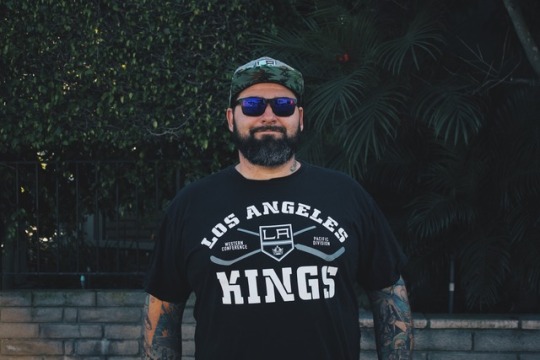
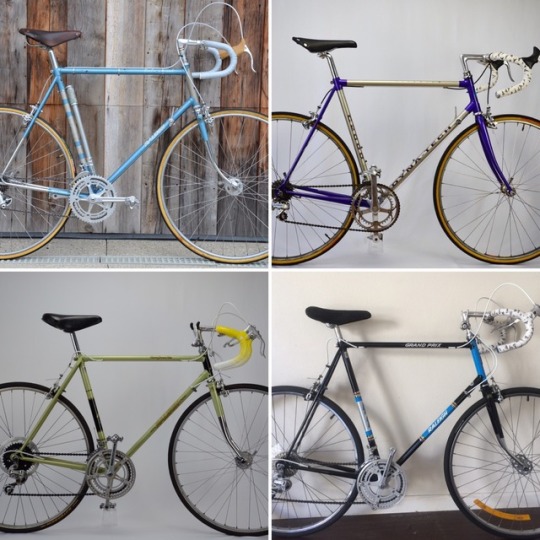
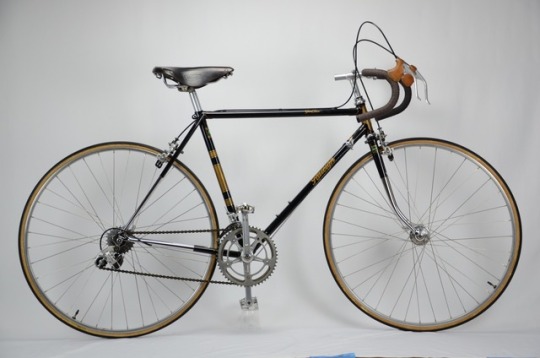

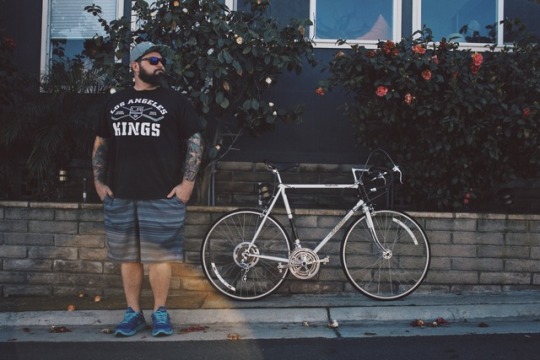
Nick 28/100 “I was born and raised in Santa Monica.” Did you go to SaMo [Santa Monica High School]? “Yeah. I went to Grant Elementary, John Adams Middle School, and Santa Monica High School. The full Malibu Unified School District curriculum.” Isn't SaMo known for celebrities attending their high school? “Robert Downey Jr., Charlie Sheen. When we went there Mel Gibson’s twin kids went there for like half a semester and the rumor was that they were sent there as punishment. They’re like, ‘Here’s some public school for ya.’ I didn’t even know they were there when it happened. Actually Santa Monica is one of the largest populated high schools. I think there’s like two thousand students on campus at all time, which is unheard of, you know. Venice High was like the second, like 1,500, and then there’s like Palisades and Malibu High. Those were the Northsiders,” chuckles Nick. What was it like growing up in Santa Monica? “Santa Monica, you know you hear like, quiet, friendly beach town, it is not friendly or quiet by any means. It is such a small city that has like, I mean like, gangs. There like five gangs in a five mile radius. Your Graveyard Crips, which are right across the street from Santa Monica College, your SM 13, basic Santa Monica thirteen gangbangers, Venice Shortline Crips, you know those three gangs, it was crazy. There was like murders all the time, and by senior year homies were gettin’ shot and like dyin’ and like holding services for these fools. Our football team, we never had a good football team because we were all a bunch of gangsters and we could never finish practice on time, and we never showed up, and you know when we did show up to play they wouldn’t play us ‘cause we’re a bunch of assholes. So it’s crazy, like Santa Monica was such a diverse group of just like beach kids and thugs, and just everything you can think of, it’s crazy.” So where in Santa Monica did you grow up? “Twenty-third and Ocean Park. Man I remembered my mom payed about $650 a month in rent for a single standing unit house, you know a two bedroom, one bathroom, it was awesome, and I was looking recently in the neighborhood, it’s a twenty-seven ($2,700) and over month place,” says Nick laughing. $650 a month in Santa Monica? “Yeah. Yeah it was unbelievable. It was the best, and Santa Monica is cool, lot of side streets and then alleyways everywhere so we can always just get to anywhere we needed to get then through an alleyway.” So where was a go to spot in high school? What did you do for fun? “Well, there were go to spots, like I was riding the bus in like fourth grade, that’s when I started riding the bus, it was fifty cents to ride the bus, so the Santa Monica bus line took us everywhere. So there was always 3rd Street Promenade and Santa Monica Pier. The 3rd Street Promenade was like the spot throughout middle school and high school, and you know they’re broken up in those blocks before they did all those renovations. The third block was called the ‘Promenade Rats,’ that’s where all the Promenade Rats would hang out, literally because the kids would have rats hanging on their shoulders. We wanted to be like those kids so we’d go hang out with them and smoke, and sneak into theaters and shit.” I thought they would be called Promenade Rats because they were rocking a rat tail [hairstyle], like back in the 90’s. “Oh, yeah the rat tail!” laughs Nick. “No, it’s because they had an actual rat tail hangin’ off their shoulder from a rat.” Was the 3rd Street Promenade as built up as it is now? “No, no. They put in those statues of the dinosaurs and stuff, and the fountains, so that brought a lot of attention so people would crowd around the fountains, so it wasn’t like really cool to hang out there and be a punk anymore. The Santa Monica Pier they had torn down all the old shit that we loved and put in a rollercoaster and a huge ferris wheel, so that kinda killed that. We stopped going there. The beach man, it was tough ‘cause you get on the bus in West LA because everyone was using their grandparents address so they can go to SaMo High with the rest of their friends, so we were one of those families that would use my grandma’s address, livin’ in West LA, taking the bus there, and man it was so hard to get off the bus when you can just sit on for two more stops and be at the beach and just chill at the ocean all day, you know. It was the best place. So it was tough, you know you’d be like, ‘We’ll go back second period. Ah, crap. We’ll go back third period. Oh, well, no point of going back now.’ That was always tricky.” How do you feel when you go to Santa Monica now? “It’s changed,” laughs Nick. “It’s all changed. Even in the last like, when I was working in Santa Monica like ten years ago, it changed so much just from then, you know. They put in that new Gold Line train, so just every couple intersections, just massive train construction for a bridge or stairway to get to the bridge.” Do you feel it has changed for the better or worse? “Umm. It’s hard to say, you know. It’s not the old Santa Monica, Old Santa Monica was chill. I guess in the sense that no one can afford to live there anymore, that’s not for the better.” Los Angeles is known for many things, one of which is the Entertainment Industry, and it is a well know fact that many individuals in the industry are not originally from Los Angeles, and is somewhat rare to find someone that is a Los Angeles native. What’s a big misconception or stereotype that many people have about Los Angeles or Angelenos? “The stereotypical thing would be something you see on Saturday Night Live. How people talk about how many highways it takes to get around the corner here and there, and we’re all laid back. I took a cross country trip with my buddies when I was seventeen, and it’s a whole different universe in between LA and New York, you know, and that’s what runs this country. And so I would say it’s easy to feel like once you’re here, born and raised here [Los Angeles] you feel like, ‘Well this is how it is everywhere.’ You can’t help but think like, ‘This must be how it is everywhere else,’ and that trip really taught me that, no it’s not. That we are a collection of the world’s top entrepreneurs, you know everyone comes here for a reason and that’s to get a great gig. There’s definitely opportunity out here and so I don’t blame people for flooding, but to answer your question, ‘A misconception?’ Yeah we’re not all laid back surfers that are doing yoga, or like hang gliding from the mountain tops, it’s a struggle out here. It’s not easy-going, never is, never has been.” So what did you do after you graduated high school? “I was wrapping up my pilot license. I got into flying real young, that was something my grandparents thought would be like a really good umm, school wasn’t my biggest thing, you know I stuck it out and finished it, but there was a little college money set aside and we kinda pow wowed and thought flight school could really hone some skills and put to use, and maybe become a private pilot or a commercial airline pilot. So I did that at the same time through high school and I think I got started too young, I got tired of just flying around by myself, or when I did have my private just the idea of flying one person to the next place, I just became a chauffeur to the skies.” What were you flying, a Cessna? “Yeah, Cessna, and later I moved onto multi-engine and got a little practice in the turbine engines and stuff and that’s when I realized this really isn’t what I want to do. We spent like fifteen grand in college fund to get there, and then the big kick in the pants was they had changed the rules to where you had to have a BA (Bachelor’s degree) to be a commercial pilot and that was the whole point was you didn’t need that. You needed a high school education and you needed a pilot license, and then hours, and so that changed. I could have been an instructor you know it’s just more of the same. Logging hours while someone is paying you to fly the plane. You know that tanked and I started working, making good money working. I graduated early, I graduated in February as opposed to June. I discovered summer school and college credits and everything to just graduate as soon as possible and start working. I moved out when I was seventeen with my buddies, you know we got a killer place together, threw the best parties, everyone worked, we just had to choke together like $1,200 dollars a month rent between the three of us. So that kept going for, you know we moved from that place to another place to Hermosa Beach, and that place was insane!” Nick lets out a laugh. “That was party central. We would bring the whole pier back to the house with us.” What season of your life are you in? “I think I feel like I’m definitely learning a lesson. I’m growing and learning from mishandling a lot of funds over the past ten years. Definitely that’s bitin’ me in the ass, so I’m like, you know kinda just like...I’m adjusting. Like to quote Eminem in 8 mile, ‘You know when you gotta stop tryin’ to live up here and start livin’ down here?’” Nick laughs. “You know things like that. I think, umm, desperation creates innovation and here I am with the Flick Nelix, and realizing this is something within my means that I can fully wrap my mind around from the beginning to end and make it happen. So that’s where I’m at. I’m starting to realize that I gotta get my shit together soon ‘cause or else it’s tough livin’ out here. West of the 405 is not for the weak.” Did you always have a passion for bikes? “Yeah, growing up that was, man, until I discovered chicks and pot it was all about just anything action sports related. Just cycling, skating, snowboarding, surfing, volleyball, just everything, so I’m tryin’ to dial back to those roots ‘cause it’s tough sometimes to find a passion and for me it’s being creative. Any opportunity to be creative, let alone get paid to be creative is the dream. So if I can sit around and conceptualize a bike and take it from a vision to a physical being, it’s very gratifying, and I get really pumped and excited about it, and not a lot does that these days.” So why vintage bikes? “Because I know that there’s a growing market in it and everything comes around full circle every so decades and I caught wind of this 70’s wave of old racing bikes, English road bikes, and it all started when I started restoring my uncle’s bike just for fun, just to get back into a hobby and then just going through the process and learning more about that process, and about that era of bicycling and it just ramped up from there. I saw how much potential there was and how little people were doing. Any opportunity to be creative is the direction I’m heading.” How did you start Flick Nelix? “Aside from tryin’ to open up my passion for cycling, I’ve recently learned how avid a road cyclist my uncle was, and I remember him showin’ up to the house to family events, and he’d ridden his bike from God knows where and he’d show up all broken and bruised and bleeding ‘cause some asshole ran him off the road, or you know he took a spill, or he was with a pot of bikes and got wrapped up, and I started remembering these things and I was just like, ‘Man, we owe it to him.’ He had passed away back in like 2002, 2003, so his bike had been sitting around in storage for that long [fourteen years] and I just remembered seeing this relic of a bicycle, and obviously I’ve been watching some shows on restoration and stuff like that and I figured ‘I love this, this is fascinating, I wish I had something to restore.’ Sure enough, there it is, it’s been waiting for me the whole time, so I gave it a go. I look into the best way to restore an old 70’s English road bike, and the way to go is you’re gonna paint it, you gotta powder coat it so it will never rust again, find the original decals, the original components, make sure everything is polished nice and bright and clean, and once I got to that point I realized that when it’s finished and it’s beautiful, it’s gettin’ tons of compliments, I was takin’ pictures of it, gettin’ a good response online, and I started to realize that there was money in this to be made. It’s not a whole lot of money but you know if I can make a couple hundred bucks here and there, a couple thousand bucks at the end of the month, it makes sense to me.” What was the story behind the name, Flick Nelix? “My name is Nick Felix and an old co-worker buddy of mine out of sheer boredom started calling me Flick Nelix, which is just a simple twist of the lettering of the name. I guess it stuck with me and then years later, you know I’m just shootin’ the shit, havin’ drinks, good friends and thinkin’ about, you know, ‘It’d be cool to get a cycling company going, maybe sponsor some riders, or start machining custom parts for bikes,’ and I asked my buddy, ‘What do you think about Flick Nelix?’ and he’s like, ‘It sounds like a trick, like a skateboard trick, like a double helix, a Flick Nelix.’ And we just got hyped on it and it stuck with me ever since, and when I did that restoration I kinda thought how I can brand it, you know. I’m not just flippin’ bikes like a Craigslist bike flipper, you know I’m restoring them to their former glory. The bike is worthy of a restoration process. Yeah, that’s how the name came about.” If you could go back in time ten, fifteen years, what is the single greatest piece of advice would you give yourself? “Dude, it’s so not exciting at all. It’d be, ‘Save for taxes.’” Nick laughs and adds, “But that was a unique situation that I was in that just fell on me like a pile of bricks, you know. Let see. I wouldn’t change any life decisions, I wouldn’t change any of my friendships, you know, I would…” Nick takes a moment of reflection. “You know it’s not fun stuff, it’s depressing, it be like maybe go back and help someone who wasn’t doing as well that didn’t make it as long as I did. Someone that may have taken their life, you know stuff like that I could have maybe have helped, things like that. Nothing really cool, like ‘Ah, man, I wished I never hooked up with that one crazy chick or something. I’ve got an answer that I would change. I would tell myself to never stress. Never ever stress. Especially over something you can’t fix or change on the spot, never stress. That’s what I would tell myself. Don’t worry, be happy, everything is going to be okay, you know.” What do you want to do before you die? “Getting in more traveling, as much traveling as possible. It’s all about traveling for me. This will always be home and it’s never going anywhere, so it’s okay to bail out of your hometown for a couple of years if you have to.” What do you like about traveling? “I guess the new experiences. I like just getting lost without ever having to worry about getting lost. I learn that when I drive, you know my worst is when I’m driving and I get like rage and then I start getting mixed up on directions and where I’m going, but when you’re on a road trip and you’re just tryin’ to get from, say like from here to New York, you can’t mess up as long as you’re just going one direction, you cannot go wrong. I remember that feeling on that trip I took when I was seventeen, I remember that feeling, never worrying about where we ended up or how much time is left in the day or whatever because it didn’t matter, and that’s what it’s like when you’re traveling.” What is your best friend going to say at your funeral? “I hear it to this day man, just fun to be around, and ahh, I don’t know, and I get that from my parents, I get that from my grandparents. We’re all just fun, happy going people. We rather laugh than bicker, you know, that’s just the way it is. In my family it was easier to be a friend than a parent figure, a grandfather figure, a grandma figure, let’s all just have fun together and not take things too serious.” 72 stories to go.
3 notes
·
View notes
Photo
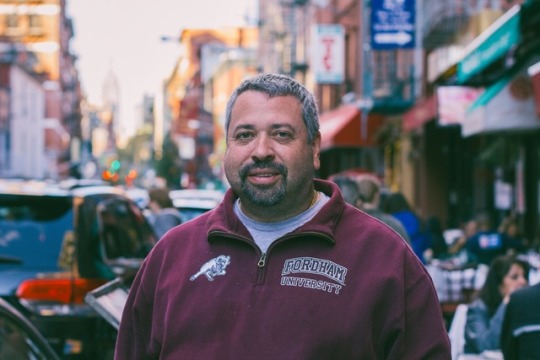
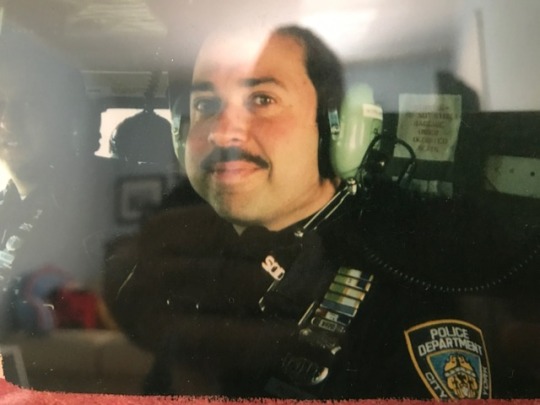
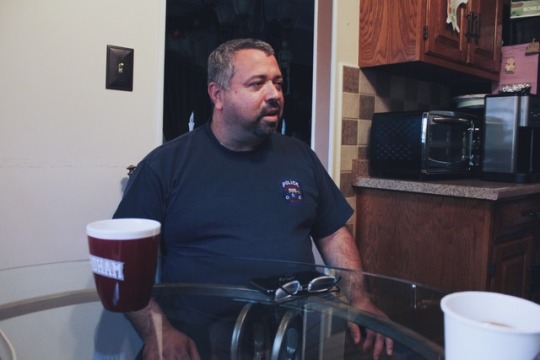
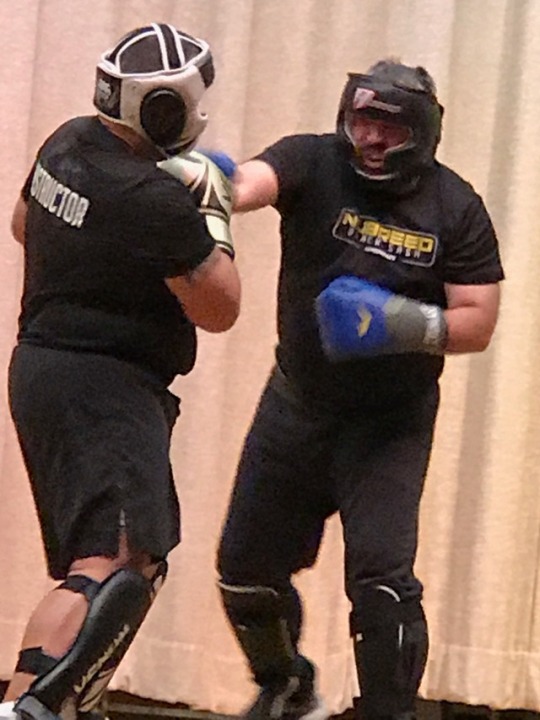
Middle/bottom right photographs courtesy of Anthony.
Anthony
26/100
One afternoon I had the opportunity and privilege to spend time with a retired New York Police Officer and a father of two beautiful girls, at his home in New York City. Our conversation ranged in everything from his recent achievement in earning his black belt in Jeet Kune Do, to his nearly twenty one year career on the police force, to his fondest moments of fatherhood.
What season are you in?
“I’m at a place where I would call it the ‘Me’ time in the sense that I’ve done my growing up, I’ve done my school, I’ve done my work, I’ve finished an entire career and moved on to other things at work and I found that I’ve done more things in the last ten years, not because I needed a promotion, or needed to get a job, but more for me because I wanted to do them. I don’t have to worry about anything but what I was looking to do, so I went back to school and studied what I wanted to study, which is history. I went back and got my Bachelor’s Degree.
After I retired I had the opportunity to do a lot of ‘Me’ things. I got a second chance with Gianna [youngest daughter] at having the experience of having your child grow up and you’re seeing all of it. I wasn’t with Angelica’s [eldest daughter of a previous marriage] mom, so I missed some of the day-to-day and I get that now. I’m here everyday, I help with homework, I pick her up from school everyday, take her to activities.”
Where did you grow up?
“I grew up in the Bronx, in New York City, I was actually born in Manhattan, and I got a Catholic school education. We had a local church that had a Catholic school, and my parents liked the education there better than a public school, so I went through the entire twelve years of Catholic school elementary and high school, and out of high school I started college. I took some bad guidance and being a bit naive, had an experience that there were other avenues that I could have explored that might have led me to have better results and have finished at the time, but that wasn’t the case. I had been preparing for what I was going to do for the rest of my life, taking civil service tests, and things like that, and got called by the Police Department, and left school before graduating in order to take the job at the Police Department. It led to a funny situation because I always said I was going to go back and finish, and I spent almost twenty-one years in the Police Department, and when I finally retired my sister gave me the application to go back to school, basically telling me that I didn’t have any more excuses.”
What attracted you to the Police Department?
“You know, it’s kind of funny because there are certain things I’ve come to see over time that people do almost in a sense of a legacy kind of thing, or go back to the old days where you had a family business and you did what your father did, or you did what someone else in the family did, and the Police Department was one of those things. I knew lots of people that were in the Police Department because their father was a cop, their grandfather was a cop, their uncles were all cops, and they become one too. That was not my case. I did it because I was taking a few tests, I was thinking about what I might want to do, whether I was gonna do something in Public Service or not, I had no idea, but they called me and I was like, ‘Yeah, what the hell. I’m gonna do this,’ but I went in with this idea that if I didn’t like it, I could quit. I knew I wasn’t going to be tied down to it, you know if I hated it I would have done something else, but I got there and realized right away that the training aspect of it was a game, and if you played by the rules, and you did what you had to do, they left you alone. If you were that sore thumb, you got paid attention to. I was lucky in the sense that I got to do a lot of the things I wanted to do, in terms of the Police Department experience. I wanted to go to a really busy place to really learn how to do it, and I did that. I worked for seven and a half years in what was probably, and arguably the busiest precinct within the city, block for block. That was in the West Bronx.
After that I was happy there, maybe even a little complacent, and somebody said to me, ‘You know, you been here for quite a while. Did you ever think about what other things you might want to try and do?’ and I said, ‘You know, you’re actually right, maybe there’s some other things in the department that I might be interested in.’ So I started to put in applications into specialized units, I mean places that I probably couldn’t get because I didn’t have what we call a ‘Hook,’ you know someone looking out for you that had some influence because they were high ranking, or they knew the right people to help you move to different places, I didn’t have that, but I put in applications to everything anyways. As chance would have it, they were starting a new unit and were noticing that I had made some inquiries into what other units I might be interested in. They asked me if I’d be interested in trying this unit [Homeless Outreach Unit], and again I was like, ‘Yeah, sure!’ It’s an opportunity to do something different and I knew going in, it was going to be a citywide thing, so it gives me an opportunity to work in other places that I might not have had the chance to work in. We started up a new unit that worked with homeless people and the good and the bad of it was nobody really knew what to do because it had never been done, at least in terms of street patrol before. It gave us the opportunity to, I don’t want to say make your own rules because that’s not what it was, but the day-to-day we figured out on our own. The way things came to be, came from that first group of us who went out and got the first experience on how you meet people. How you talk to them, how you get them to accept whatever services we can guide them into, and of course on the enforcement side, we did not make any arrests on homeless people, but we would breakout encampments where you would have large numbers of people putting up tents and shacks, and things like that, those kind of things we would dismantle.
None of that had ever been done before, so we kind of laid the groundwork for how those things were done. Plus the fact that it was a citywide initiative, which gave us the opportunity to get a taste and a feel for what other parts of the city were like. New York is funny in the sense that every borough is different than another. They all have their unique things that are different, so policing at each one of those boroughs was as diverse and different as the boroughs themselves were, so you got to see what it was like to work in each one of those places.”
Is there a moment that you can remember that you felt proud to be a police officer?
“I think if you sat down with a hundred police officers, no matter where they were from, every one of them can give you a hundred stories on different things, but there are some things that stay with you for one reason or another, for good and for bad.
I think the most fulfilling thing was, in anything that you do, where you come across a lot of people, you never really get to know all of them, and you don’t necessarily remember a face or name, but having done the Homeless Outreach, which was the name of our unit, for a number of years I had someone come up to me one day in Battery Park.
He came over and shook my hand and said, ‘Do you remember me?’ and I said, ‘No, I’m sorry, but I actually don’t. I imagine we’ve met before.’ and he replied, ‘Yeah, we’ve met before. You don’t remember but you came and you spoke to me, and you asked if I needed anything, or if you can help me with anything, and you suggested job training and I decided to go with you.’ So apparently we took this person to a place where they had the appropriate social worker with connections to job training programs, and he said, ‘After doing that I took the job training, and got a job, an apartment, and I don’t live on the street anymore.’ It was a good thing and something I will never forget. People leave impressions and sometimes you don’t realize you leave impressions.”
What was your first week on the police force like?
“When you go out onto the street, everybody knows you’re the brand new guy because all your leather stuff is bright and shiny, everything is glittery and it’s kind of funny because when you work in a place that is very busy and has a lot of crime going on, the people out on the street, they know who the new guy is too. They look at you and you’re all bright and shiny and everybody else is kind of little bit disheveled, so they challenge you from time to time. They want to see what you’re made of, but that’s part of the game.
The first day I ever went out on patrol, it was raining, coming down in buckets and when you’re that brand new rookie they put you out with someone else. Eventually you do a foot post, a foot post is a solo post, so they had myself and another rookie, we happened to be on the same block, and Sergeant brings us in the van, drops us off over there and goes, ‘Okay, you have this side of the street, you have that side of the street. No standing together, I don’t want to see you talking. I’m gonna be coming around to check on you, I want you to be out here when I see you.’ So there was crazy rain and I was lucky that the side of the street that I was on, there was a funeral parlor, and I don’t know why but funeral parlors tend to have awning, so at least I had something to stand under and the guy on the other side of the street didn’t have that. Luck of the draw, I got the good side.”
What was one of the craziest calls you ever had?
“Near the end of my time on the police department, I did narcotics in the Sugar Hill section of Harlem, but I had an injury previous to going there and I needed to have surgery so I was unable to stay in narcotics full time. They sent me back to my previous assignment, which was the Homeless Outreach Unit, so I went back there and the Police Commissioner decided to make a change and they combined our unit with a sister unit that was in the transit division to where we were now covering both street and transit.
So it is New Year’s Eve, 2003 going into 2004 and my partner and I come on duty and are working a 2:00p.m. to 10:00p.m. shift. So it’s like 2:15p.m. and the Lieutenant says to us, ‘I need you two guys to go out to 23rd Street and 8th Avenue, meet the District Captain there. He’s got a situation and he needs you guys to do a track walk.’ So we leave our office and drive down to 23rd Street and 8th Avenue. The 8th Avenue line is the A, C, and E trains, very, very busy lines. They run from Brooklyn, some of them run up into upper Manhattan, some of them into Queens, plus 23rd Street and 8th Avenue is just a busy intersection, it’s where you start to get into midtown Manhattan on the West side. We get there and the Captain says to us, ‘Okay, train crew say there’s a suspicious package.’ Now a suspicious package can be almost anything, but it’s something out of the ordinary. It could be a box, a bag, or something along those lines, and there’s something about it that leaves them to believe that there is some sort of suspicious aspect about it, so you have to go and check and see if it might be something dangerous. So my partner and I go walking out, we were told it was about a hundred and fifty feet out into the tunnel and it was along the catwalk. The catwalk is in certain areas in the subway in order to do maintenance and such. There is a platform that’s raised on the side of the tracks that you can walk along, it’s a safe area, and trains can go by you while you’re on the catwalk. So we go walking in and we find a yellow backpack. It looked as though if you had your bag and you take it and place it right down on the ground, and anything in the subway you come to learn quickly that things don’t end up looking like someone just placed them down. It’s something that falls off a train, something that someone throws on the tracks, so it’s not sitting perfectly. The other thing is because of the fact that you have metal wheels on metal tracks, you have breaks, you have different things, anything that is in the subway for any period of time becomes covered in this kind of dust that only exists only in the subway, and it’s a brand new, nice clean bag and it looked like someone has placed it down there.”
So what was going through your mind?
“Well, it was one of these things where we went back and explained this to the Captain there’s nothing to indicate that there’s a problem per se, but it is a nice, clean, brand new bag and it looks like somebody just placed it down there. Somebody could have an agenda, and this is 2003, so it’s post 9/11, it’s New Year’s Eve, so you have people leaving town, people coming into town for celebrations, so he says, ‘Okay. So what we’re gonna do is have Emergency Service come.’ New York Police Department is not like any other police department in the country. It’s bigger, we tend to have more resources than most other departments, and we use different terms for some similar things, but what’s unique to New York City Police Department is the unit that does special weapons also do a number of other things, including rescues. When you guys are home [Other regions of the U.S.] the police department have a S.W.A.T. team that handle situations that call for heavy weapons, but if there is a car accident, a rescue, the fire department does it. Here [New York City] our Emergency Service Unit is a fully dedicated unit that does all of that. Matter of fact, they do it better than the fire department does. You’re stuck in an elevator, you’re in a car crash, you need to get off of the side of a building, I can guarantee you you’ll want Emergency Service to come even more than you want the fire department to come. So anyways, they also have more training on these kind of items to see if there might be something suspicious. So what we do is we make the decision, after the discussion with the Captain, he decides to now bypass all local service to the 23rd Street stop, so there will only be trains on the inside, or express tracks, and nobody is stopping there. The E.S.U. [Emergency Service Unit] member responds and the Captain says, ‘Take him out and show him the bag,’ so my partner and I escort the E.S.U. member out to the bag to see what he thinks and he comes to the same conclusion as us, ‘There’s not necessarily anything dangerous, but in light of the whole situation, let’s not take any chances, we’ll call for the bomb squad to show up.’ So we put a call in for the bomb squad and in the meantime we showed up at this location at about 2:30 in the afternoon, by 3:30p.m. the E.S.U. is there and we’ve already shut off local service.
So now bomb squad comes, between ourselves and the Emergency Service people, we explain to them that it doesn’t necessarily look like it could be anything, no telltale signs or wires hanging out or anything, but we don’t want to take any chances. He [Bomb Squad Technician] says ‘Okay. In light of the whole situation,’ and in terms of being expedient now at this time, ‘we’ll destroy it right here.’ Now he tells the Captain we need to shut all service on the A, C, and E lines and now it’s around 4:30p.m., this is the middle of rush hour on New Year’s Eve, so we shut all train service. He [Bomb Squad Technician] goes out to his truck and he comes down in his bomb squad suit, carrying a little rectangular, what looked like a Tupperware, and there’s water in it, and inside there’s a little brick of C-4 explosive.
He says, ‘We’ll just destroy this right here. We’re gonna blow it up here.’ He goes off to the corner and takes his C-4 and builds a little bomb and before he can go out and do this [detonate bomb], when you’re in the subway there are grates and different openings that come out to the street level, so because he is going to set off an explosive device, you now cannot have anyone walking or driving in the area in case something may happen. So now we have to stop all vehicular and pedestrian traffic, North and South, East and West at 23rd Street and 8th Avenue. Now there’s nothing moving, people, cars, trains, nothing.
He goes walking out to where we told him it was and we’re all just kind of talking and laughing and you know, there’s a nervous energy, like ‘Wow, this guy’s gonna blow this thing up in the middle of the subway, like how cool is that? That shit you only see in the movies.’ So he goes out there and I don’t know, it’s ten minutes later and he comes walking back and he still got his little bomb, and he goes, ‘Where’s the bag?’ ‘What do you mean, where’s the bag? We told you where the bag was.’ There’s three of us now, myself, my partner, the E.S.U., we all went out there, we all saw it, nobody is crazy. There’s no bag there. The Captain goes, ‘You two. You’re gonna walk from here to 14th Street and find what happened to that fuckin’ bag.’ So I’m on the Uptown side and my partner is on the Downtown side of the tracks and we’re walking down trying to see if we can spot what happened to this bag. One of the features of the subway is you need to be able to get out in case of a situation [emergency]. All of a sudden I hear my partner going, ‘DROP THE BAG! GET DOWN ON THE GROUND!’ So I go running across all four tracks to get to his side and I see him, gun drawn. ‘GET DOWN ON THE GROUND! DROP THAT BAG!’ I come running across and all I see from my vantage point are legs and a hand holding the bag. So we come up here and we got this guy at gunpoint, can’t really see that much, so we climb up onto the catwalk and now this guy is refusing to drop this bag. We finally get there and grab him, and we get the bag away from him. So the end result was a homeless guy that was staying down there and somebody gave him a new bag. For a homeless guy’s clothes we literally shut down subway service in part or in full from 2:30p.m. in the afternoon until well after five o’clock on one of the busiest train stations, three full subway lines on New Year’s Eve, when people are trying to get out of town and into town for the ceremony at Times Square.
You always have to in those situations, if you’re going to make the error, make the error on the side of caution.”
Do you remember the morning of 9/11? Where were you exactly?
“Well, for me I worked the afternoon shift at the time, so I was not working the morning of 9/11. My daughter was having trouble medically and so we needed to see a doctor, and we made an appointment to go that morning. I was already divorced from her mother, but we went together to see the doctor. When we got to the doctor’s office the news was on. It was the morning time and that happened like 8:40a.m., the first plane, so when we got there everyone was buzzing about it. ‘Yeah, the plane hit the World Trade Center.’ By the time we went in to see the doctor and came back out the second plane hit and then you started to see people upset because by the time we got out the first building fell. Once you knew that two planes hit, you know everyone knew what it was. There was no doubt in anyone’s mind that it was a terrorist act. By the time I got home, you know without even being told, every TV station, every radio station was ordering every police officer to respond to their work site, they mobilized everybody. The only people, if you were out sick, you didn’t go in and of course if you were on vacation you weren’t here, but other than that everybody’s gotta show up. It depends on where you are, really classically you’re suppose to go to the nearest police facility, so I did that at first. I went to the local precinct and they said ‘We have plenty of people here, so it’s not like we need you to be here. Where do you work?’ I explained where I was at, he goes, ‘Alright, just check in with your place and let them know you were here already so they give you credit for being here, and then see what your boss wants you to do.’”
Where were you at this point in time?
“I was in the Bronx and I was living by my mother’s house, and where the local precinct I went to, but our office was in Queens, so I needed to come over the bridge. That was surreal because I went to the Whitestone Bridge and by that time all the bridges were already closed. I just threw on a uniform shirt and the bridge and tunnel officers saw me in the car with the uniform shirt and just waved me right through and I went over the bridge and got to our office in Fort Totten.
From September 14th all the way into December, I was at Ground Zero everyday. Because we were part of Special Operations Division, I went everyday with one of the two Sergeants that were assigned with us, and we were assigned to Liberty Street. We were actually in the Fire Department facility there, Engine Truck 10, which is literally across the street of the World Trade Center. So we were assigned there everyday, well at first it was a tent that was there on the street, and then we eventually moved into the building. They had nobody in the building because the building had been damaged when the towers fell.
Our specific job was a liaison between the Fire Department and Police S.O.D. because then what we were doing was dispatching people. The Fire Department mobilized the same way the Police Department did, so when you do that you have many more people than your equipment needs to be operated. Even in a fire house, there are several shifts so you only need one crew to operate the truck, but you may have two or three crews in terms of the number of people that are there [Ground Zero]. So in order for them to get to Ground Zero, we were coordinating getting busses and escorts and things like that to get them directly down to Ground Zero because you couldn’t drive or go anywhere, and of course there were police check points.
It was a funny situation because the first couple of nights I was there they had built some temporary fencing around the area to allow only vehicles that were actually doing work in there to get anywhere even close to the site. You would have trucks come down and they would load debris, and steel, and things that needed to get out of there, but they would need to examine it. So it would need to go to a certain site, and I would be going out and telling inspectors, high ranking people, what they needed to do, or what we needed, so it was kinda funny.
We had this inspector the first night and we were bringing trucks in; I was kind of like the runner between where we were set up and coordinating these certain things, to where he was with his hundred, or hundred and fifty cops that were doing perimeter patrol, making sure no one came in, and patrolling the gate area for vehicles to come in and out.
You would never ever under normal circumstances be able to go to somebody at that rank [rank/title], for me a cop, and go ‘Listen, I got trucks coming in, they need to get in over here.’ There would be a Sergeant, Lieutenant, or Captain would go to him [Inspector] and say ‘We need this,’ but for me to be able to go right to him and he says to me ‘What do you need?’ ‘This is what we need to do. We’re gonna do this, this, and this.’ and he says ‘Okay.’ and verbatim, the same way I told him, he’s sending that same information out, so it was kind of strange in that sense.”
Is there something you will never forget about Ground Zero and the aftermath of the attacks? A sound, a smell, an image?
“There was a lot of different things like that. I think for me it would be two things: The first day I went down there —September 13th, 2011 — you couldn’t walk directly in like you have when the World Trade Center was there; everything is cut off, everything is closed, where they could put fencing up, they did, but even so, streets were blocked. So we had to go around a different way past Battery Park City, which is actually across the road from where the World Trade Center was, and in through some buildings to come out the other side. It was like almost going through this big circle. The Fire Department is just throwing water on this smoldering wreck so we were actually walking through like ankle deep water that was mixed with that powder that you’ve seen on everybody when you saw the news that first day or two, when everybody was coated in white. So now it’s like mud. You could look through parts of it [wreckage pile] and it was still red, like a barbecue when you look through the coals and see that red glow.
The other thing was, several of the days while we were working logistics out and doing different things, we went from Floyd Bennett Field to Ground Zero by helicopter and we would fly over it. You would see pretty much what those aerial shots you see sometimes on television or in some books, that’s exactly what you would see.”
What was your initial reaction when you arrived to Ground Zero the first time?
“It was more in awe than anything else because it was so different and not like anything else. From a visual perspective it was very surreal. You saw some pictures on the television or stuff like that because everywhere you went the news was on, but it was almost like the scene in the Planet of the Apes, when Charlton Heston is walking across the beach and he sees the top half of the Statue of Liberty, and it’s like buried in the sand, that’s kind of what it was like. Even though you saw the pictures, you get there and all you see is that skeleton, the outside girders that were on the building are all jagged and hanging out at odd angles and such, and that’s the first thing you see, plus the fact that everything is just in a pile.”
If you could go back in time and tell your younger self one piece of advice, what would it be?
“I think that I would advise that person to be a bit more serious about education and taking advantage of your youth, in terms of the kind of things you might want to do that you don’t necessarily get to do later in life once you settle in and you have other responsibilities. I can’t say that I have any regrets about what I did, you always have regrets about some things that you do it’s the way life is. You make a decision, it comes out wrong, you regret that decision, but overall I can’t complain. I’ve lived a good life, I’ve done a lot of things that most people will never do. Could I have done more? Yeah, absolutely. Could I have gone some different directions within the police department? Yeah, probably, you know I could have made a few changes there and that’s okay, but overall that was a positive experience and I think life in general has been a positive experience. I don’t have too many complaints about the way things have turned out and overall I’ve been blessed with the fact that I can live the kind of life that I want to live. I’ve also been lucky in the sense that I had a good job that I actually enjoyed doing, I’ve been blessed with good family.”
What do you want to do before you die?
“I always liked to travel, but I did not get to do it as much as I would have liked to do, so I’d like to see some places in Europe that I have not had the chance to see.” Specifically the south of Europe, Italy, Greece, etc.
Our conversation shifted from his time on the police force to his family and Anthony went on to recount the life altering experiences of the birth of both of his daughters. In both deliveries, he was blessed enough to be able to hold his daughters first before their mother due to the standard surgical procedures of a cesarean section. Anthony laughs as he recalls a funny moment when his youngest daughter peed on him while he was holding her for the first time shortly after her birth.
“We talked politics earlier today, there’s always these discussions that go on and people’s opinions and things like that, but there’s no doubt that these things [birth of a child] are a miracle. I mean look, it’s nature, but nature in itself is a miracle. That fact that we have a physical world around us that operates in a certain way and things happen, and things grow, and they die and come back, it’s all in it’s own way a miracle. It’s a beautiful world. Life is a wonderful thing.
If I could throw a word of advice out, and I tell people this every once and awhile, you get up in the morning it’s a good day, no matter what age you are, you understand this. You get up in the morning it’s a good day. Most of the time when you have a bad day, we do it to ourselves. Everyday has got the potential to be a good one, and look, I know sometimes things are beyond your control, and something happens and it makes it a lousy day, but even lousy things that happen your attitude, the way you deal with it, how you think about things goes a long way to whether that thing affects you, or it’s a challenge you gotta work through, but it doesn’t affect your mood, how you look at things, or what kind of life you want to lead. Some people let those things get to them. Circumstances you can’t control might turn out to be something bad, but you can still have a positive attitude about it, and if you have a bad attitude it makes it worse.”
Another notable quote and piece of advice I got from Anthony while entering a restaurant in Manhattan was: “Always sit facing the door so you can see who comes in.”
Thanks Anthony.
74 stories to go.
1 note
·
View note
Photo
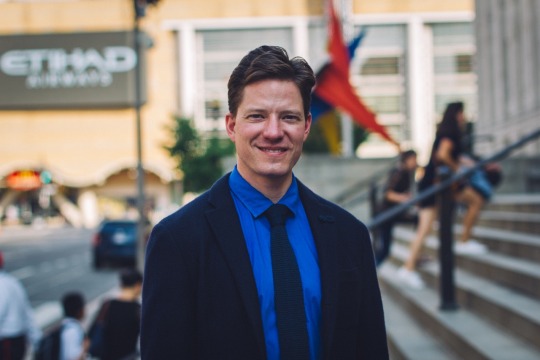
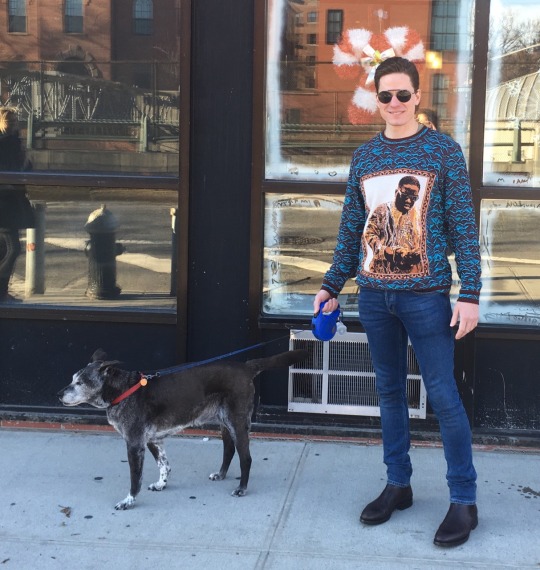
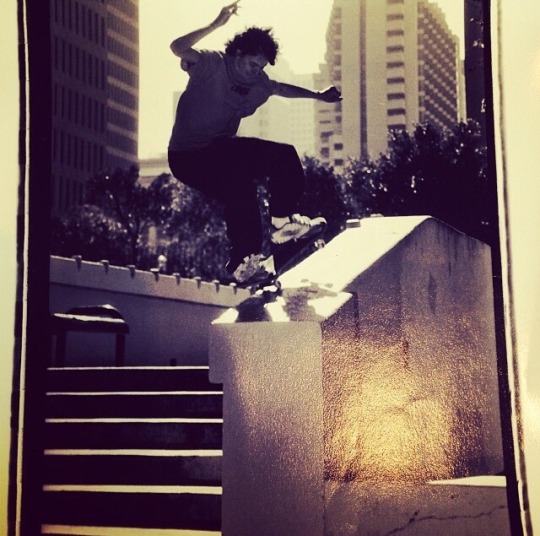
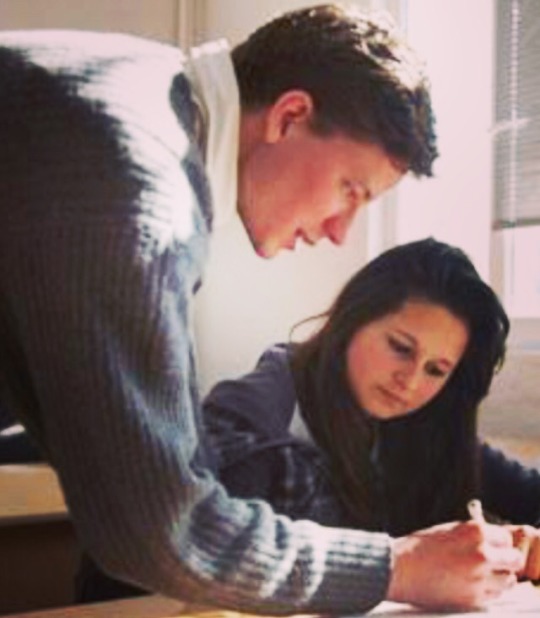
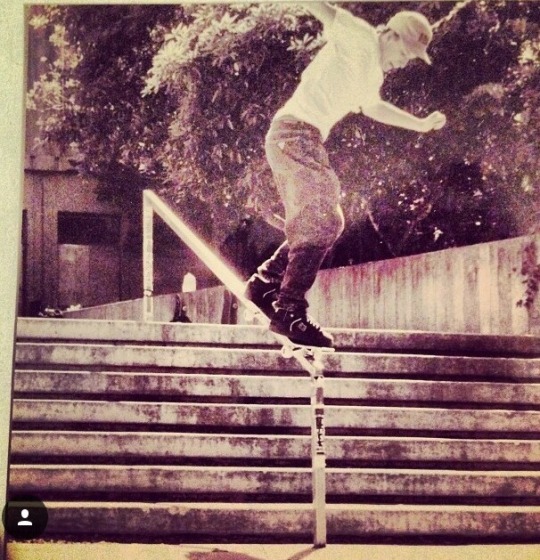
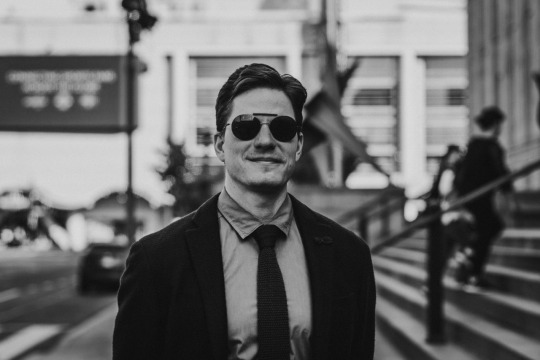

Center photographs courtesy of Albin Sikora
Albin
25/100
It was a pleasure getting a chance to meet and talk with Albin, because we share something in common. Albin recently completed 100 interviews in 100 days, through his Question Number Five project, where he explored concepts of care and community. “Having spent the last two years researching Medicare reimbursement policies, the Affordable Care Act and other health care issues as part of my work at a communications firm, I’m convinced that care cannot only be about insurance or payment or access. I set out to find some answers but came up with five questions instead,” says Albin. To check out his 100 interviews and for more info on his project, visit albinsikora.com.
When I asked Albin what drives him, he simply replies that the newness of every day fascinates and drives him. He is compelled to follow what grabs his attention, sometimes to his own detriment he admits, but he lives his life moment to moment. “I’m a storyteller,” says Albin. Everything he does is some form of storytelling.
Does one have to be cautious or courageous to live in the present moment? After meeting Albin on the steps of the National Portrait Gallery in Washington D.C. one afternoon, I was convinced you must be fearless to truly live in the moment, not in the future, nor in the past. To surrender your expectations, your plans, your will and allow life, your heart, or for many, God, to guide your path through the unknown. It’s exciting, exhilarating, and terrifying. Albin lives by this truth daily.
When I asked him what season he was currently in, Albin replied, “If I could put it into an actual season, I would say summer because I’m equipped to live life.” He went on to add that all his experiences in life leading up to this current moment have prepared him and made him the man he is today. As our conversation carries on, Albin casually sits with a warm, humble attitude and an exuberant personality. Only thirty-six years young, but telling by his candor and the way in which he carried himself, you can sense that he has already lived a lifetime worth of life-changing experiences, stories, and memories.
Originally from Chicago, Albin fell in love with skateboarding at an early age. While many consider tearing down the streets, and just being on the streets in general, to be a reckless lifestyle, Albin embraced the opportunity to meet all different types of people and be comfortable with them. Later, he would distinguish embracing that intoxicating feeling of both riding a skateboard and connecting with others and the world as a form of fearlessness instead of recklessness. He thinks that fearlessness is what drives you to actually execute what you set out to do.
It was this same fearlessness that landed him in the nation’s capital, when he spontaneously moved to Washington D.C. without a job or knowing anyone, simply to experience something new and fill what he perceived to be a gap in his understanding of the U.S. because he sees himself as an ambassador of the country. Albin currently works in Public Relations for Powell Tate, and is no stranger to taking leaps of faith that most of us only dream of while spending a lifetime standing on the ledge. At the age of eighteen, Albin picked up and moved to San Francisco to attend university. As liberating and exciting as this new chapter in his life may have been, he recounts a sobering moment, when he fell and crashed while skateboarding down a steep hill in the city. While lying on the ground with the wind knocked out of him, bleeding from a few different parts of his body, Albin came to the realization that he was alone in a completely different city, and he would now have to rely purely on himself and watch out for his own well being.
Over the years, Albin has lived in numerous different cities, working various jobs, that were nothing short of interesting. While living in Los Angeles for a year, he worked as a daytime room service delivery boy at the Chateau Marmont in West Hollywood, and recounts some of his hilarious celebrity run-ins and casual sightings during a day’s work. He also served in the Peace Corps in Bulgaria in a predominately Muslim community where he taught English courses, held job training courses and coached basketball.
During the 2000’s Albin saw a Hip Hop magazine with R Kelly on the cover, wearing ridiculously large sunglasses, he chuckled and told himself that he had to work for this magazine. Determined to work for this company, he looked up the address in New York City and strolled into the lobby of this Hip Hop magazine owned by Damon Dash, and asked for Smokey D. Fontaine. When Smokey made his way to the center of the loft office, with great moxie and not a second’s hesitation, Albin said he wanted to work for him, to which Smokey replied, “You start today.” Albin would go on to work for this magazine until he landed his dream job working at one of the biggest talent agencies in the world.
Another moment that changed his life was spending everyday with residents of public housing, undocumented workers and the homeless in Richmond, Virginia while working at the Legal Aid Justice Center. Albin believes it’s important to speak about injustice on social media but that is only one platform. People need to feel it in order to do something about it that reflects their own values, not those of anyone else. He recounts an unfortunate time when he witnessed an eighty year old woman get evicted from her project apartment because her grandson, whom she had not spoken to in years, was convicted of a drug felony across town. Her grandson was still on the lease and according to the law, if anyone living in public housing is convicted of a felony, everyone living in the apartment gets evicted.
When asked what piece of advice he would give his younger self, Albin replied, “Just keep on. Keep doing what you’re doing.”
When asked if he’s ever been in love, Albin went on to say that he was once, but didn’t realize that he loved a long time girlfriend until years later after the relationship was over.
Before he dies he wants to write a novel and have it published.
What I learned from my conversation with Albin is to trust your own life’s journey. Too many times in my life I lost love for myself or self-respect because I constantly compared myself to others and their experiences, or did not trust the process of life. As Albin proudly proclaims that he is equipped to live life, he exudes confidence and a sense that he is comfortable in his own skin and with who he has become. I may not be at Albin’s level yet, but I am now in a stage in my life where I’m beginning to love myself more and more each day. Many live cautiously in the future or in the past, but like Albin, we must relish in living fearlessly in the moment, ready to move to where our heart leads.
75 stories to go.
#100stories100paths#life quotes#lifestyle#life#story#passion#blogger#travel#washington#dc#interview#inspiration#motivation#fearless#quotes
3 notes
·
View notes
Photo
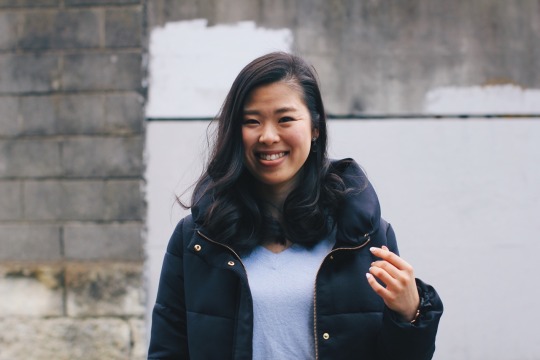
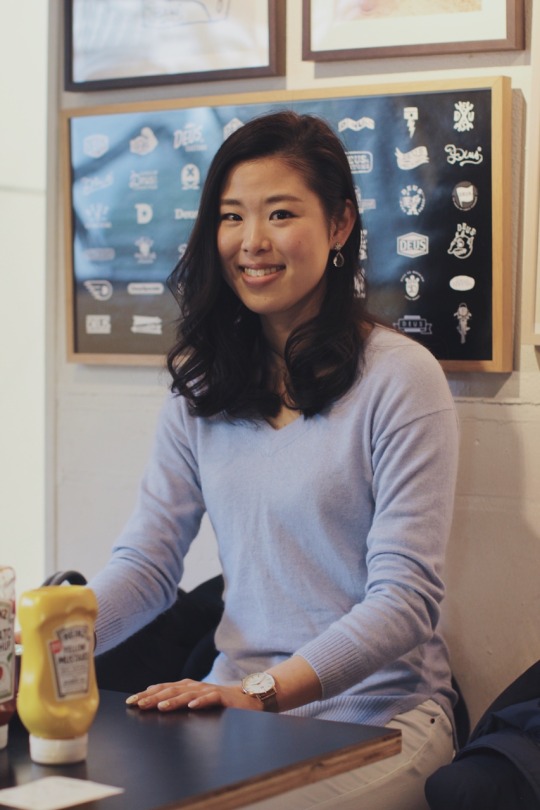
Shiori
24/100
I met Shiori randomly at a cafe in Tokyo one afternoon and had a fun and honest conversation with her. Turns out she is an avid traveler, who has been to different countries across the globe, and loves to explore new places and cultures. What I remember about her most from the short time I was with her was her laugh.
Where were you born and where did you grow up? (出身地はどこですか)
“I was born and grew up in Nagoya until I moved to this area(Kanto) to work. I currently work at the airport.” (名古屋出身で、就職でこの地域(関東)に来るまで名古屋で育ちました。今は空港で働いています。)
What are you going through in your life right now? (今現在は人生のどのような時期ですか?)
“I think I need to do everything hard, both work and play.” (今は全てを一生懸命頑張る時だと思っています。仕事も遊ぶのも。)
If you could go back in time and tell your younger self one piece of advice, what would it be? (もし過去に戻って自分にアドバイスするなら、何を伝えますか?)
“If I could go back ten years ago I would tell myself, ‘Please have more fun.’ Enjoy a lot of things like what you want to do, or what I’m interested in because when I was around twenty, I think I was quite a boring person. I just studied and followed what my parents told me. Never jumped into the new culture. So if I can advise myself, around eighteen of twenty years old, just "do what you want and try new things”. That’s my advice to myself.“ (もし10年前に戻れるなら、「もっと遊べ」と伝えるでしょうね。やりたいことや興味のあることを楽しんでと。20歳くらいの頃の私は本当につまらない人間だったと思うんです。ただ何となく勉強して、親の言うことを聞いて。新しい文化に飛び込むなんて絶対にしなかったです。だからもし、18歳とか20歳くらいの自分にアドバイス出来るなら、やりたいことや新しいことに挑戦しなさいって言いたいです。それが今の私からのアドバイスです。)
What are you passionate about? (今何に熱中していますか?)
"I love traveling. I actually met this friend(referring to here male friend across the table) in France. I was an exchange student and I traveled a lot, could meet a lot of people and could see many places, that changed me a lot. So I think I should continue to travel to see new things and people to make my life more fruitful one.” (旅行が大好きです。実はこの友達(目の前の男性を見て)とはフランスで知り合ったんです。交換留学中にたくさん旅行をして、いろんな人に会って、たくさんの場所をみて、私の人生はすごく変わりました。だから私は人生をより充実させるために、旅行を続けてもっと新しいものを見たり新しい友達と会うことを続けるべきだと思います。)
What do you want to do before you die? (死ぬ前にしたいことは?)
“I want have my own family. ” (自分の家族を作ること。)
Daughter or son first?(息子と娘だったらどっちが先?)
“Son first, then the second a daughter. I want to have two kids.” (男の子が先で、2人目に女の子。2人子供が欲しいです。)
Was there a time you felt scared and what did you do about it? (恐怖や不安を感じた時はありますか?その時どのように対応しましたか?)
“When I started to study in France. I was exciting but scared a lot for my new life. I had a language barrier, no experience to live alone and no Japanese friends around me at very first. It was really scared, actually stressful and tired, to live a life with some difficulties alone. However, I got friends who has similar fear and we could overcome the scared time together. My family in Japan also supported me a lot. I couldn’t get over the time alone.” (フランス留学を始めた時に。すごいワクワクしたけれど、同時に新しい生活に不安もたくさんありました。最初は言語の壁があって、私は一人暮らしもしたこともなく、日本人の友達も周りにいませんでした。実際はストレスだらけで疲れたし、1人で問題を抱えながら過ごすのは本当に怖かったです。でも周りには同じような悩みを抱える友達がいて一緒に乗り越えることが出来ました。日本にいる家族もすごい支えてくれましたし。1人では乗り越えられませんでした。)
What’s your favorite quote in Japanese?(日本語で好きな名言はありますか?)
“'Action before words.' I’ll do what I want, before worrying about failure which may not happen. I can seek solutions after it happen.” (不言実行。起こるかもわからないことを心配するのではなく、まずやりたいことをやる。解決策は後でいくらでも探せますし。)
76 stories to go.
4 notes
·
View notes
Photo
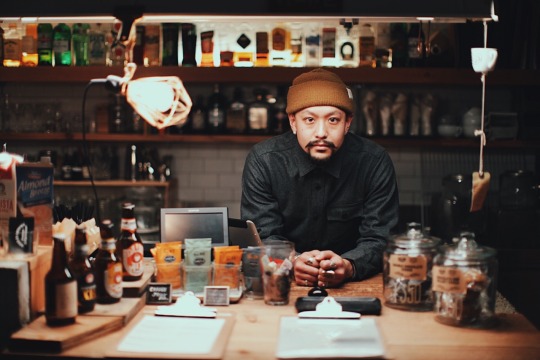
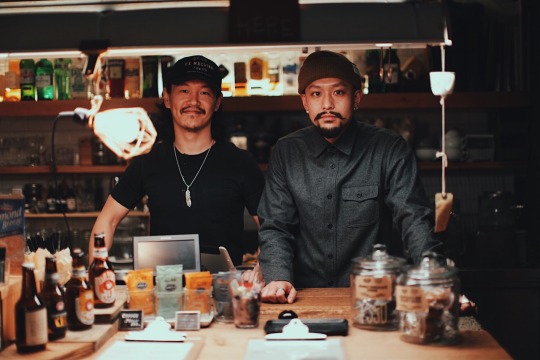
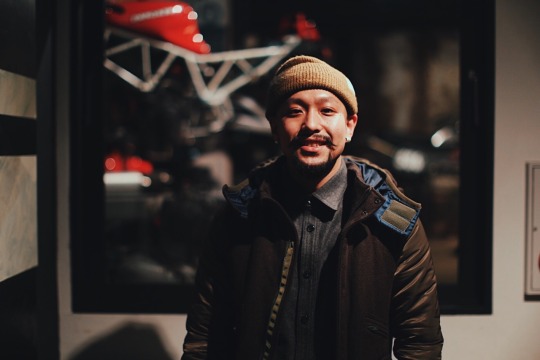
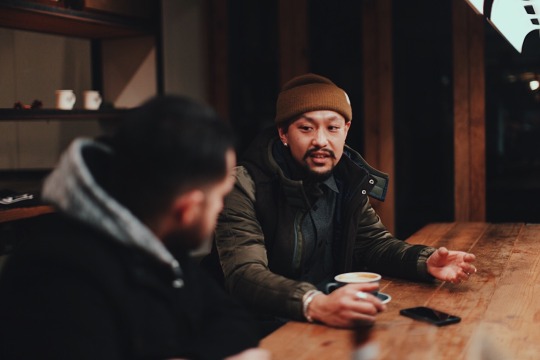
Photographs courtesy of Macvisuals
Show
23/100
One afternoon, while wandering the streets of Harajuku in Tokyo, I was lucky enough to stumble upon a contemporary bar and cafe called, Deus Ex Machina, where they are known for their delicious cocktails, coffee drinks, apparel, and classy, yet hip atmosphere. They’ve managed to blend the motorcycle, fashion, and mixology culture in a brilliant and inspiring manner.
The bartenders/baristas, Show, Nori, and their fellow colleagues, their passion and love for their craft was savored with every sip of coffee, cocktail, and craft beer. From wall to wall, creativity and their unique sense of style was expressed through their fashion, delicious food and beverage, and ambiance.
I was fortunate enough to sit down with Show, a bartender/barista at Deus, and hear about his love for mixology and how he came to Tokyo.
“At end of March I going to quit this job (Deus) because I have to take up at the bar.” Show is taking on a bar manager position at a bar in Tokyo.
「3月の終わりに私はこの仕事��やめようとしました。東京のバーでバーマネージャーを務める。
Do you live around here?
あなたはこの辺に住んでいますか?
“Yeah, pretty much. I live in Yoyogi, just a ten minute ride on the bicycle.”
「はい、かなり、私は代々木に住んでいて、自転車に10分乗っています。」
Where did you grow up?
あなたはどこで育ったのですか?
“I was raised in Fukuoka, which is the South side of Japan. It’s like the central city of the Kyushu Island, you can get there by airport. Once you get airport, you can take a train, just ten minutes to go to the central city. It’s like, concentrated. There is also good nature, like the sea and mountains, and that’s why there is good quality of the food, like seafood and meat, and stuff, and also liquor stores. My father and my grandpa was sushi chefs, that’s why I’m in the food society and drink society right now.”
「私は日本の南側にある福岡で育った。それは九州の中心都市で、飛行機でそこに着くことができる。そこに飛行すれば、中心街までわずか10分の列車で行くことができるそれは濃縮されています海や山のような自然もありますので、魚介類、肉、酒のような質の良い食べ物があります。私の父と祖父は寿司シェフでしたので、私は食べ物や飲み物にいます今の文化。
Have you ever wanted to follow in your father’s and grandfather’s footsteps and become a sushi chef?
父親と祖父の足跡をたどって寿司シェフになりたがっていますか?
“Ah, no. That is more specialty of the food. I want to focus on the drinks, like cocktails, coffees because when I was in New York City, food was quite expensive, but the drink stayed affordable, like coffee, any beer, liquor, so when I was there I don’t have money. So I was really enjoying the drink culture in New York City, like coffee, and the cocktails.”
“いいえ、それはより多くの料理専門です。私はニューヨークシティにいた時、食べ物はかなり高価だったので、カクテル、コーヒーなどの飲み物に集中したいと思いますが、飲み物はコーヒー、ビール、私がそこにいたときにはお金がなかったので、コーヒーやカクテルなど、ニューヨークの飲み物の文化は本当に楽しかった」
When were you in New York?
あなたはいつニューヨークにいたのですか?
“2008 to 2013, five years.”
2008年から2013年の5年間。
What part of New York?
ニューヨーク市のどの部分?
“Brooklyn, but I was working at the Manhattan.”
“ブルックリン、しかし私はマンハッタンで働いていた。”
Was mixology, and coffee, something you were always passionate about, or something you fell into?
ミックスロジー、コーヒー、いつも情熱を持っていたもの、落ち込んだものなどでしたか?
“Yeah, I mean not only for the drink and food thing ‘cause I used to be a dancer and also walking for the fashion, I will say I really like to make something, like I do make jewelry. I think I really love to make something, you know, creative stuff.”
「はい、私はダンサーやファッションモデルでもあったので、食べ物や飲み物だけでなく、ジュエリーを作るような、本当に何かを作っていると言います。私は本当に何かを作るのが大好きだと思います。あなたが知っている、創造的なもの。
What do you ultimately want to become? What would your dream job be?
あなたは最終的に何になりたいですか?あなたの夢の仕事は何ですか?
“One day I want to make my store, of course, but this time I want to spread the cocktail and drink culture for more younger generation because in Japan, younger generation doesn’t know how to drink, you know. They’re just more focused about the coffee these days. I think the coffee big wave is gonna stop because people get bored ‘cause to much coffee shop in Tokyo.”
「いつか私の店を所有したいと思っていますが、今回はカクテルを広げて若い世代に飲みたいです。日本では若い世代が飲み方を知らないからです。今日は東京にコーヒーショップがたくさんあるので、人々が飽きると大きなコーヒーが止まるだろうと思う」
What season are you in currently?
あなたは現在どの季節ですか?
“Summer, I like to have sunshine because I’m from south side.”
「夏、私は南側から来ているので、日差しが好きです。」
If you can go back in time and tell yourself one piece of advice, what would it be?
あなたが時間を遡って自分自身にアドバイスを伝えることができるなら、それは何でしょうか?
“I would say, actually I’m not like, good student, kinda stupid,” Show laughs and continues, “Do bad things, you know, so I was taking a class in junior high school, high school, the class doesn’t mean for life. The classes I don’t think are very important, but just learning is very important because you have to, like keep going. I didn’t have energy for it at the time, but now I know it, how much important learning is. So learn everything.”
私は悪いことをしたので、私は中学校や高校で授業を受講していました。授業は生涯ではありません授業はそれほど重要ではないと思うけど、勉強は非常に重要です。なぜなら、あなたはそれを続けなければならないからです。私はその時はエネルギーがありませんでしたが、今は学習の重要性を知っています。 “
What do you want to do before you die?
死ぬ前に何をしたいですか?
"I don’t need money, like I don’t want to be a rich man guy or something like that, just take up my son, daughter, wife, that’s enough for me. I did want to have family because I had dad and mom, but they divorced and I was with my mom, so I was kinda alone when I was in elementary school.”
「お金は必要ありません。私は豊かな男やそのようなものになりたくはありません。私の息子、娘、妻が私には十分です。私はお父さんとお母さんがいたので、家族がいたいです。しかし、彼らは離婚し、私は母と一緒に暮らしていたので、私が小学校にいたときに私はちょっとだけだった」
Do you have any brothers or sisters?
兄弟姉妹はいますか?
“I actually have, but the father is different.”
「私は実際にはいるが、私たちには異なる父親がい��」
Do you still speak to them?
あなたはまだ彼らに話しかけていますか?
“Yeah, I have like, relationship with them, just living separated.”
“はい、私は彼らと関係があります、私たちはちょうど離れています。”
So whom would you say is the most important person in your life?
あなたの人生において最も重要な人は誰ですか?
“In my life? Dad. He also liked good quality of things, like food, fashion, music. When I started dancing, because of my dad. He cannot dance, but he like to listen to music like soul, funk, any kind of dance music.”
「私の人生では、お父さんは食べ物、ファッション、音楽のような良質なものを楽しんでいました踊りを始めたときは父親のためでしたが踊ることはできませんでしたが、あらゆる種類のダンスミュージックがあります。
So you learned a lot from your dad about fashion, food culture, music?
だからファッション、食文化、音楽について、お父さんから多くを学びましたか?
“Yeah.”
“はい”
So I’m assuming you traveled a lot around the world?
だから私はあなたが世界中を旅したと仮定していますか?
“Actually I’ve been to twenty countries when I was eighteen, it was a cruise. I didn’t go to college, it’s quite expensive and also I didn’t know what to learn from college. Dad think if he pay for college it’s better that I go around the world because the cost is almost like, same.”
「実際に私はクルーズで18歳のときに20カ国に行きましたが、私は大学に通っていませんでした。それは非常に高価です。また、私は大学で何を勉強するかわかりませんでした。私が世界を旅したのは、それが同じであったからです。
Out of all the places you’ve been to around the world, is there a place that was most influential to you?
あなたが世界中に行ったすべての場所の中で、あなたに最も影響力のある場所がありますか?
“Of course it’s New York City.”
“もちろんニューヨーク市。”
Do you still dance?
あなたはまだ踊っていますか?
“Sometimes, but not like before because I don’t have time to practice for it.”
「時には、私は練習する時間がないので、前には好きではない」
Do you have any regrets in your life?
あなたの人生に後悔がありますか?
“I don’t have any regrets right now 'cause I did what I want.”
「私が望むことをしたので、今は後悔していない」
In the world today, is there anything you wish to see a change, in society or in your daily life?
今日の世界では、社会や生活の中で変化を見たいものはありますか?
“For the Japanese, I want them to go more out of the country because people to much stay in Japan. They think always in one way, that means they lost freedoms. I will say, like good thing is bad thing, everything is gonna be good experience, especially when people are out of their country.”
「日本人にとっては、多くの人が日本に留まるだけなので、彼らはもっと国を出て行きたいと思っている。彼らは自由を失うことを意味する一方的な考え方だ。悪いものは良いものだ。特に人々が他の国に旅行する時には、
How long ago did you move to Tokyo?
東京に引っ越したのはどれくらい前ですか?
“It’s been almost four years.”
「これは4年近く経っている。
Did you move to Tokyo after New York?
ニューヨークに引っ越して東京に引っ越しましたか?
“Yeah. This is first time living in Tokyo.”
「はい、これは初めて東京に住んでいます。」
Do you like living in Tokyo?
東京に住むのが好きですか?
“First time, I really hate Tokyo,” says Show laughing. “I feel like shit.”
「最初は、東京を本当に嫌っていました。 “私はたわごとのように感じた。
Why is that?
何故ですか?
"People kind of cold, than my hometown, and also kind of boring for me.”
「ここの人々は私の故郷よりも寒いし、私にとってもちょっと退屈だ」
And how do you view Tokyo now?
そして今、あなたは東京をどのように見ていますか?
“I like it more because I have my connection with my crew, bartender crew, baristas, you know. I found the same, like purpose people, going the same direction.”
「私はバーテンダーの乗組員であるバーストと結びついているので、もっと好きです。同じ目的を持って、同じ方向に進む人々を見つけました」
How old were you when you were in New York? Is that when you became a bartender?
あなたがニューヨークにいたとき、何歳でしたか?あなたがバーテンダーになったときですか?
“After New York City I started bartending.”
「ニューヨーク市の後、私はバーテンダーを始めた。
You came out to Tokyo to be a bartender?
あなたはバーテンダーに東京に来たのですか?
“Yeah, but when I was in New York City I was working for some Japanese restaurant, as a waiter.”
“はい、ニューヨークにいた時、私はウェイターのような日本食レストランで働いていました。”
Did you like it in New York?
ニューヨークで好きでしたか?
“Yeah, I like it, but I need to have energy. It’s stressful, smells bad, and noisy, it was tough, but I enjoy it, kind of like a workout,” says Show with a smile on his face.
「はい、私は気に入っていましたが、エネルギーが必要でした。ストレスがあり、匂いが悪く、騒々しくて、苦労しましたが、楽しいものでした。運動のようなものでした。
What is something people don’t know about you?
人々があなたについて知らないものは何ですか?
“Maybe people know it, about me, I’m not gonna hide anything.”
「人々はすでに私について知っているかもしれないが、私は何も隠さない」
77 stories to go.
#100stories100paths#life#story#blogger#stories#lifestyle#tokyo#japan#travel#photography#mixologist#coffee#deus ex machina#harajuku#shibuya
3 notes
·
View notes
Photo
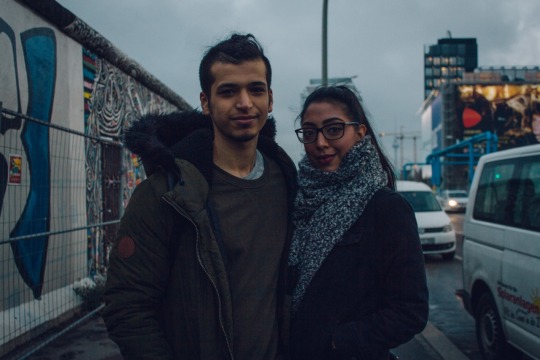
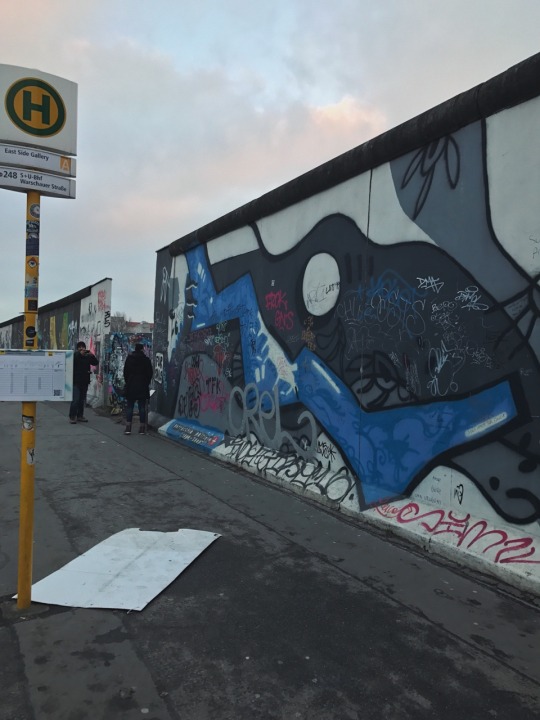
Salman & Hannah
22/100
I randomly met this lovely couple from the U.K. one afternoon in front of the East Side Gallery in Berlin, which is a remaining stretch of the Berlin Wall that is completely covered in murals and graffiti.
What season are you in?
Salman
“I think I’m just trying to finish my university and start off my career. Get that out of the way, then I might start exploring.”
Both Salman and Hannah attend the University of Leeds in the North of England. Hannah is originally from Manchester and Salman is originally from Saudi Arabia.
Hannah
“Same stage, self exploration and sort of knowing who I am as a person, but knowing who I am as a couple as well, how that effects me as a person and how it effects my lifestyle and stuff like that.”
If you could go back in time, what piece of advice would you give yourself?
Hannah
“Don’t sweat the small stuff, ‘cause it’s not worth it.”
Salman
“Pursue the things that you love, the things that make you excited. Do that.”
What drives you? What’s your passion? What do you get up in the morning for?
Hannah
“These are hard questions,” says Hannah jokingly. “I’ve always thought I had a plan in mind, but the more I’ve sort of lived and know myself, the more I find you can’t plan anything, you just have to wait and see what the day brings and go ahead and get out there and see what there is for the world to offer you, and just explore and experience everything really.“
Salman
“My motivation is art, which is a great place to talk about because we are right in front of the Berlin Wall. Like if I produce any creative work in a day, that would be a good day for me.”
What do you want to do before you die?
Hannah
“Just live a life with no regrets, and to get to the point where if I am on the edge of death, to not think ‘I wish I have done this,’ or ‘I wish I have done that.’ Just live a really full life to the point where I’ve seized everyday and made the most of it, even if it’s just doing simple things with people I love.”
Salman
“She stole that right from my mouth. I was gonna say that. Just no regrets.”
78 stories to go.
#100stories100paths#life quotes#lifestyle#life#stories#people & blogs#blogger#artist#art#berlin#germany#travel
2 notes
·
View notes
Photo
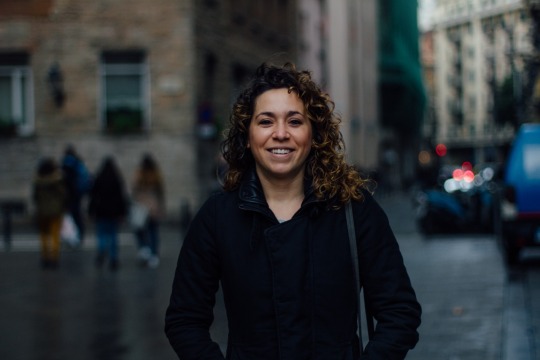
Eva
21/100
I had the pleasure of meeting and interviewing Eva in the streets of the Gothic Quarter in Barcelona, Spain.
¿lo que te motiva?
What motivates you?
Lo que me motiva es mi familia, estar con gente que me hacen sentir bien, con gente que me hacen sentir cómoda.
What motivates me is my family, being with people that make me feel good, with people that make me feel comfortable.
¿Si pudieras volver atrás en el tiempo para darte un consejo, cuál sería?
If you can go back in time to tell yourself one piece of advice, what would it be?
Que no me preocupe por tonterías, por cosas que no tienen importancia realmente.
To not worry about nonsense, or over things that are not really important.
¿Qué quieres hacer antes de morir?
What do you want to do before you die?
Vivir. Vivir bien. No preocuparme de tonterías y disfrutar de las pequeñas cosas. Quiero vivir.
Live. Live well, to not worry about nonsense and enjoy the small things. I want to live.
79 stories to go.
2 notes
·
View notes
Photo
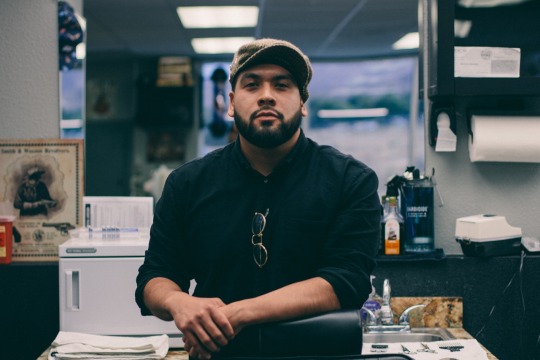
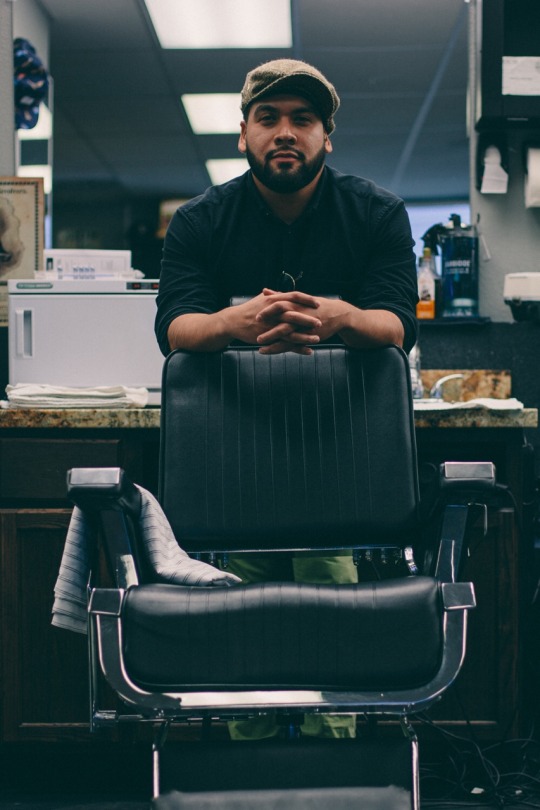
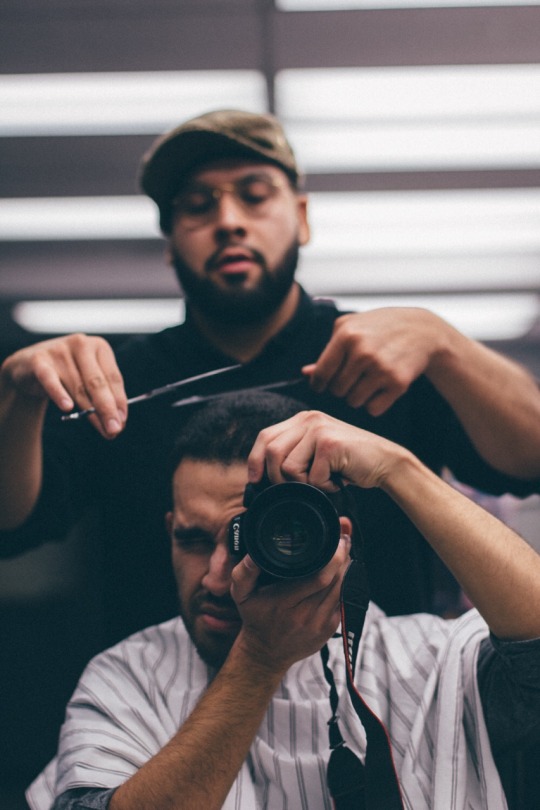
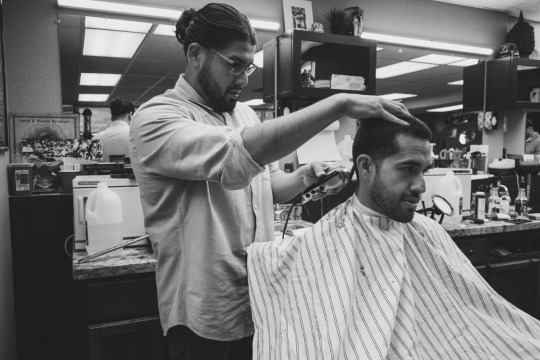
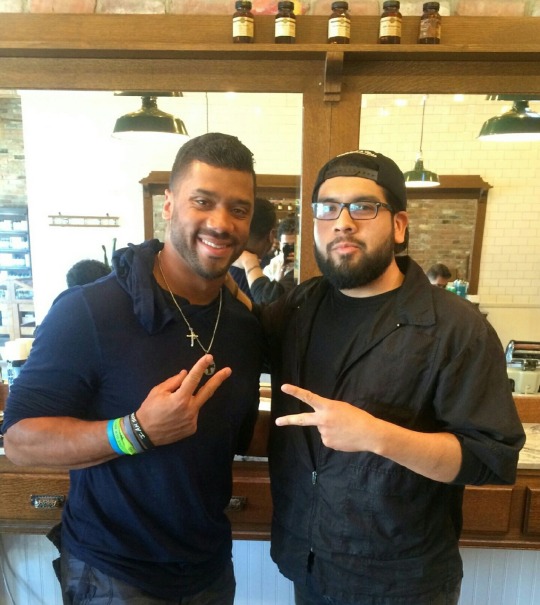
Bottom right photograph courtesy of Baxter Finley Barber & Shop
Emi
18/100
For men, the barbershop is a sacred place, where you not only go to get a fresh cut or line up to boost your confidence, but also for the fellowship shared with others during the brief time in the barber chair. Men share stories and laughs, talk about women, and even open up about their lives. I took the opportunity while in the chair to interview my barber, Emi.
What I admire about Emi is not only can he cut my stubbornly wild hair with ease, but also his optimism, yet having a pragmatic approach to all aspects of his life.
He is currently in a season of embracing life and discipline. “Dropping bad habits, practicing positivity daily no matter the negative circumstances, and being grateful daily,” says Emi. He is set on not falling into the routine of making bad decisions, that one can easily find themselves making with a detrimental mind frame, while in a negative environment. These bad decisions always lead to bad consequences.
In light of his current season, Emi is embracing change by throwing away unnecessary items in his life, literally and figuratively, as he enters a new chapter in his life. Anything and everything from items in his room or workspace that no longer have a use, to toxic and draining relationships with friends, colleagues, and women.
He strongly believes to speak up and say what’s on your heart because tomorrow’s not promised. Don’t be afraid to tell someone that you love them, or that they hurt you, or your proud of them, or simply sharing a piece of advice. “What if you get in a car and get killed in an accident and there was something you wanted to tell me but didn’t? You had something for me that I’ll never have for the rest of my life because you didn’t say something,” says Emi.
As our conversation went on and my hair began to take its form, Emi shared another piece of advice. “Keep your romantic relationships like you do your finances, to yourself,” says Emi. Many would think that statement is common sense, but unfortunately far too many of us have been guilty of not applying this to our lives.
Before he dies he wants to travel the world in peace, on an indefinite time period, nothing holding him back, and not having to worry about bills, or any pressing issues.
When asked what piece of advice would you give your younger self, Emi replied, “Don’t listen to the negative people that are trying to hold you back.”
A highlight of his barber career so far has been opening up his own shop, The Village Barber Shop, as well as cutting Super Bowl XLVIII Champion and quarterback for the Seattle Seahawks, Russell Wilson, while working at Baxter Finley Barber & Shop in West Hollywood.
82 stories to go.
4 notes
·
View notes
Photo
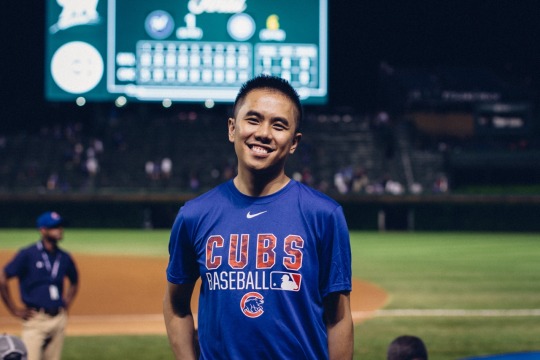

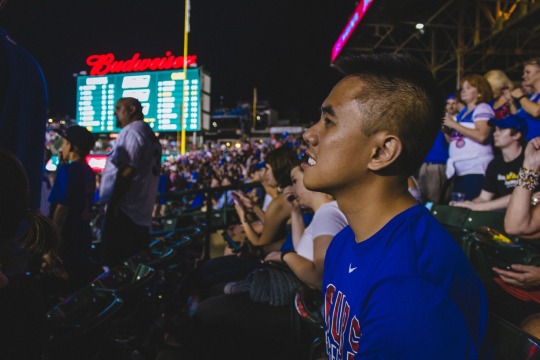
Andrew
16/100
Usually sitting next to a stranger for a long period of time can be awkward and uncomfortable. When someone sits right next to you in a movie theater, or on a flight, or during some type of meeting or conference, you find yourself having an internal conflict, debating whether or not to move over, or fake going to the bathroom just to find another seat, but you don’t want to come off as rude. The struggle is real. But surprisingly, it wasn’t awkward catching a Cubs game with Andrew one evening, even though I literally met him for the first time an hour or two earlier, right outside the front gates of Wrigley Field. I had an extra ticket, why not give it to a complete stranger.
With a cold brew in hand, and Jon Lester on the mound for the Cubs, Andrew and I took in the game and opened up about sports and life. I felt as if I were catching up with an old friend.
Andrew is currently in a season of exploration. “I want to try new things and find out my limits,” says Andrew. He is currently attending the Roosevelt University, and majoring in pharmacy. He also works at a Walgreens as a Pharmacy intern, and looks to one day become a Pharmacist. A defining moment in his life was when he was twenty-five years old, working at a restaurant and bar, and one night while cleaning up vomit he told himself to go back to school. Another reason why he wants to become a Pharmacist, he says as cliché as it may sound, he wants to help people.
I was able to relate to Andrew, not just because of our love for sports, but also the fact that we are both first generation Americans. His family immigrated to Chicago, Illinois from China years ago.
Andrew became a Cubs fan at an early age while watching their games on television. When I asked him what it is like to be Cubs fan, he replied, “One sick joke,” then let out a laugh. The last time the Chicago Cubs won the World Series was 108 years ago. He goes on to recall the times he was disappointed over the years after the Cubs early exits in the playoffs, even recounting the infamous NLCS game in 2003, that is known by many Cubs fans simply as the Bartman incident. On that strange October night, a fan named Steve Bartman, will forever live in infamy, reached out for a foul ball and interfered with Moises Alou’s catch, which led to the unravelling of the game and inevitably the Cubs chances of reaching the World Series. “I was in high school when it happened. I cried,” says Andrew jokingly.
I can somewhat relate to Andrew’s plight of being a Cubs fan. I myself am a Dodger fan, and the last time the Dodgers won the World Series I was two months old, I just recently celebrated my twenty-eigth birthday. That’s a long time, but 108 years is an eternity. I asked if he has ever rooted for another team, or contemplated becoming a fan of another team, such as the cross town rivals, the Chicago White Sox, Andrew said he couldn’t root for any other team because at the end of the day the Cubs are his team. Now that’s faithfulness.
When asked what piece of advice would you give your younger self, he replied, “I wouldn’t tell myself anything. My life experiences made me who I am.”
Before he dies, he wants to go bungee jumping.
An interesting quote Andrew said was a twenty-five cent analogy he heard somewhere about life. It doesn’t matter what combination of change you have, five nickels, or a two dimes and five pennies, or one quarter, in the end it all adds up to twenty-five cent, you can get to the same endpoint in many different ways and no path is correct.
84 stories to go.
1 note
·
View note
Photo
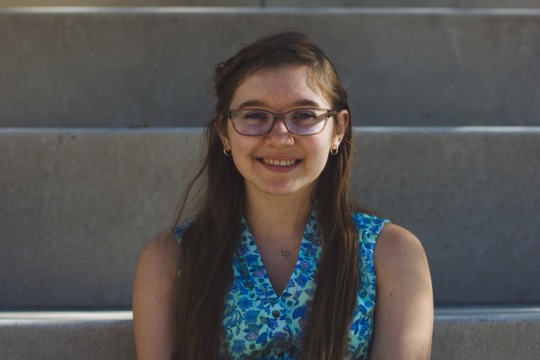
Emily 15/100 In the heart of Chicago, a river runs through the labyrinth of skyscrapers, where there is no shortage of cozy, picturesque places to go on a romantic date, take a walk, grab a drink, or in my case walk up to unsuspecting strangers to interview them about their life story. After I spent some time on the Riverwalk reading a book on some concrete steps, I noticed Emily not too far away, writing in her journal, so I decided to make my move. Emily is a current student at Columbia College Chicago and is passionate about art, writing, and American sign language. She is currently in a season of growth, where she is learning more about herself. She’s venturing out of her comfort zone to try new experiences, and in light of this, she has recently accepted an offer, from a young man, to take her out on her very first date. When asked what piece of advice would she give her younger self, she replied, “Stop giving a fuck.” She also added to stop worrying about other people’s opinion and to live your life. Before she dies, Emily would like to write a book about her life experiences and adversities, and have it published. The book will include her illustrations. 85 stories to go.
1 note
·
View note
Photo
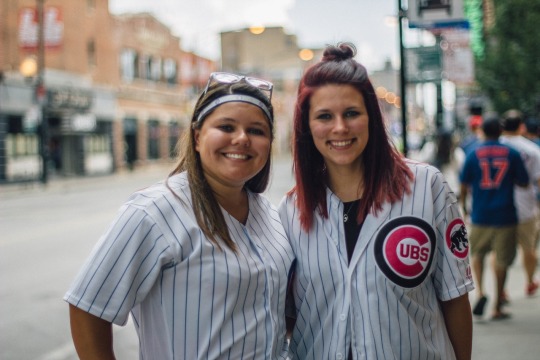
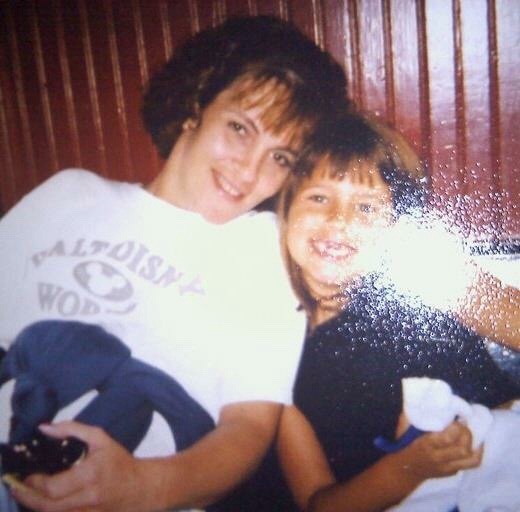
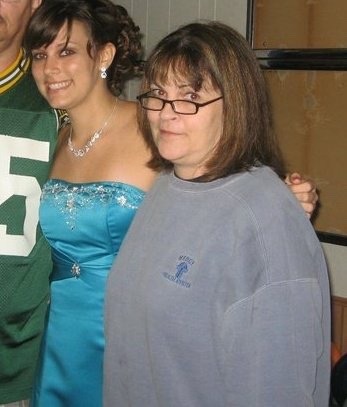
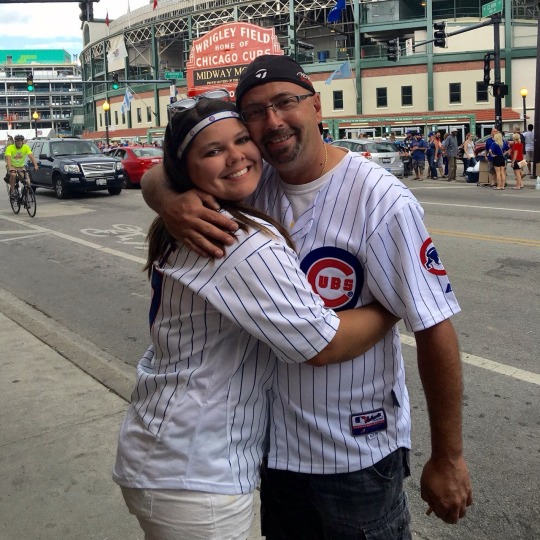
Top photo: Krystal (left) Stephanie (right). Middle photos: Stephanie with her mother. Bottom photo: Krystal with her father. Photos courtesy of Stephanie Wichelt. Krystal & Stephanie 14/100 I met Krystal and Stephanie one afternoon outside of the Chubby Bear bar in Chicago, on Clark Street, directly across from Wrigley Field. It’s a humbling experience to have an open and honest conversation about life and our hopes and desires with strangers you just met. Krystal and Stephanie are both from Wisconsin who traveled to Chicago to catch a Cubs game. Krystal says she grew up a Cubs fan because her father is an ardent Cubs fan. Krystal is currently in a season of looking to start a new chapter in her life and enter the Peace Corps. Stephanie is in a season of learning, where she looks to grow as a person. When I asked them both what piece of advice would they give their younger self, Krystal replied, “Study more and don’t take your education for granted.” Krystal is currently studying to become a nurse. Stephanie paused for a moment then said ever so gently with love in her voice, “Tell my mom more, that I love her.” Sadly Stephanie’s mother passed away from respiratory failure nearly six years ago. When asked what they want to do before they die they both replied, “ Go skydiving.” After this brief yet beautiful encounter with Krystal and Stephanie, I was reminded that there is a bigger world outside of ourselves. That the man sitting next to you on the train ride to work, the barista at your favorite coffee shop, or in this case the strangers passing by on the sidewalk, their lives are so incredibly precious and unique. When we are so consumed with our needs, struggles, and at times ego, we become disconnected and oblivious to the life moving around us. We miss the opportunity to have a real genuine experience with another human being and share a laugh, a smile, a shoulder to cry on, and a connection. We become so desensitized that we are actually surprised when we hear the words “Me too,” when we open up to another person about our insecurities, fears, failures, and heartache. When someone recalls a difficult time in their past, as Stephanie had done, we are reminded that everyone has a past and a significant story to tell, and purpose. Thank you to the two beautiful souls, Krystal and Stephanie. 86 stories to go.
4 notes
·
View notes
Photo
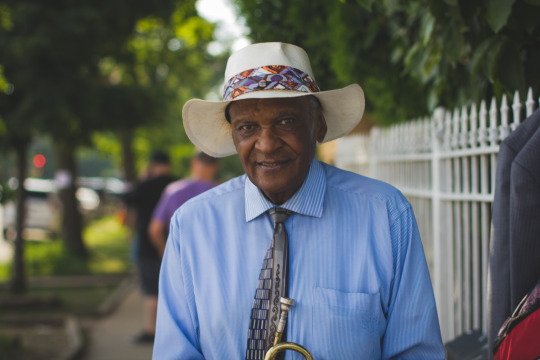
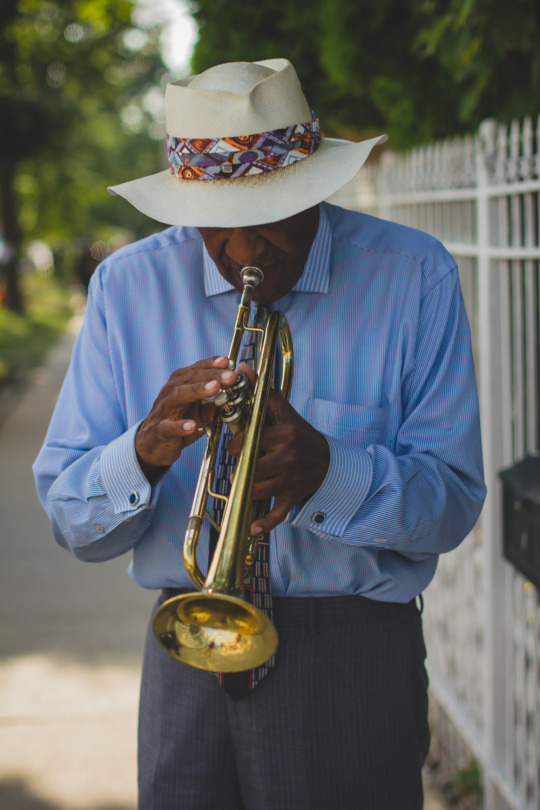
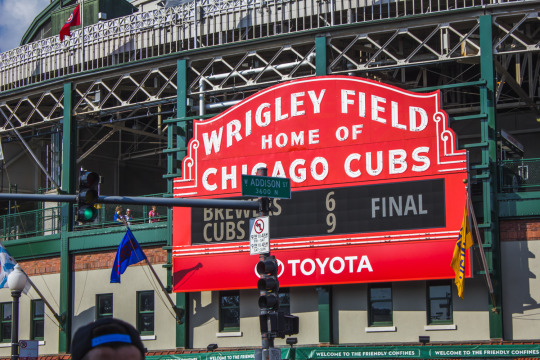
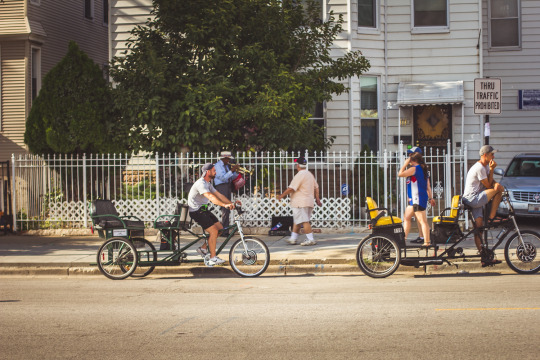
Jim
13/100
Right outside the friendly confines of Wrigley Field, at the intersection of Clark and Addison, a humble and elderly man full of life, by the name of Jim, joyfully plays some catchy tunes on his trumpet for faithful Chicago Cub fans passing by as they exit the ballpark after a Cubbies victory.
I casually went up to Jim and only had a few minutes to speak with him, but none the less his answers and advice were insightful and poignant. He said he’s been proudly playing his trumpet outside of Wrigley Field for ten years now and has no intention of stopping any time soon. Jim is currently in a season of expectations.
When I asked him what he wants to do before he dies, he let out a chuckle accompanied by a warm smile and responded, “Honestly I don’t want to die. I’ll have everlasting life through God’s son, Jesus Christ.”
When asked if he could go back in time and give his younger self one piece of advice, he replied, “Do it God’s way.” He went on to say that he spent years of his life living for himself and craving out his own path in life by leaning on his own understanding and knowledge. “I thought I was smart and new everything about the world and my life,” says Jim. Misguided by his own hubris, Jim would come to learn that God’s will for his life was a life of true happiness, abundance, and righteousness. He would also add that the sooner we surrender our will and follow God, the sooner we will find our purpose, happiness, and peace.
Jim says he just lives a simple life by living daily by the golden rule: ”Do unto others as you would have them do unto you.”
87 stories to go.
2 notes
·
View notes
Photo
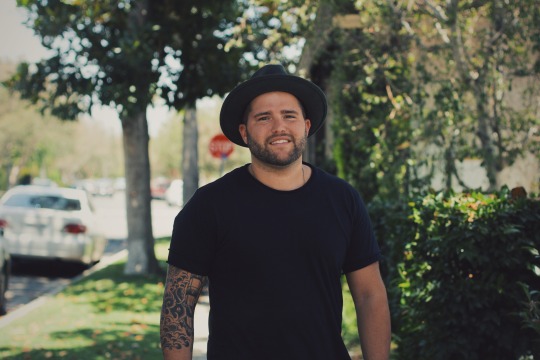
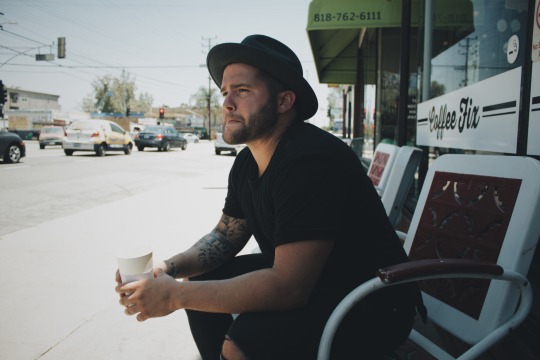
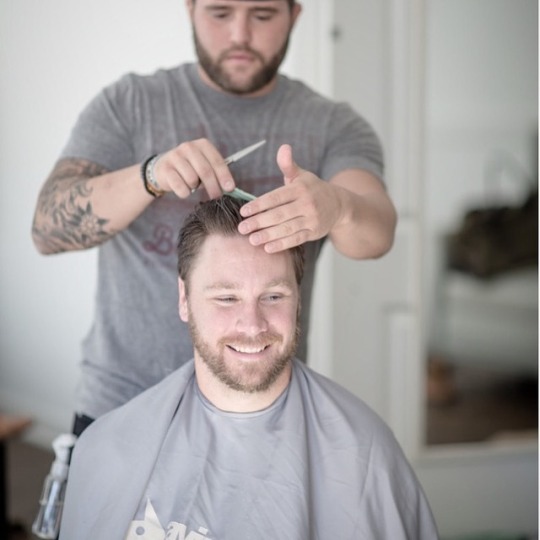
Bottom photograph courtesy of Tiffany Kelly.
Josh
9/100
He may seem like just another ordinary face in the crowd but his story would prove to be the contrary. Josh is a multitalented individual with a entrepreneurial mindset, and a fascinating story of how he went from working with a world renowned magician in Las Vegas, to touring as a drummer, to becoming a hairstylist.
Josh is currently in a season of growth in his craft and career as a hairstylist, looking to sharpen his skills and broaden his network of clients. “If I’m not growing or learning I feel like there’s something wrong,” says Josh.
His story begins years earlier in Florida when he was attending a community college, where he failed all his classes due to his partying lifestyle. “I broke up with my girlfriend at the time and flew out to Vegas for a job that a friend had for me.” He would go on to worked for David Copperfield at the MGM Grand as a Stagehand, working with props on stage. I can only imagine the stories and experiences one can have living at the MGM Grand while working for David Copperfield.
One day Josh went back home to visit and was sitting in a church service one evening but was not listening to the sermon, but God placed something on his heart. “I couldn’t tell you what the pastor was talking about that day but God placed Bible college and discipleship on my heart.”
He quit his job as a Stagehand in Vegas and decided to go to Bible college in Louisiana two months before the beginning of the school year.
After two years in Bible college he went on to attend Edison College in Fort Myers, Florida, where he would receive a scholarship and study Music Theory and Jazz. He began teaching and touring as a drummer but did not like the inconsistency of the touring lifestyle, so he then was seeking a job that would be more financially stable.
Josh recounts the time he was sitting in a salon one day when a friend told him about hairstyling and the opportunities. He would then go on to attend Paul Mitchell The School Fort Myers, Florida for hairstyling. Josh has been a hairstylist for five years now and looking to expand his brand.
When asked what piece of advice would you give your younger self, Josh replied, “Think about your future.”
Before he dies he wants to learn how to fly an airplane. “I always wanted to fly fighter jets,” added Josh.
As our conversation went on and we watched the time pass by sitting in front of the coffee shop, one thing that Josh said really resonated with me. “It’s God’s Grace that He hasn’t granted all the desires of my sinful heart because I would be in a real bad place,” says Josh. “I’d probably be divorced twice already, have millions of dollars, and have no need for God.” What I got from Josh’s statements is that God won’t always give you what you want but He will give you what you need, even if it’s adversity to strengthen and build your character. It was a pleasure listening to Josh’s stories and gaining some knowledge from him.
91 stories to go.
3 notes
·
View notes
Photo
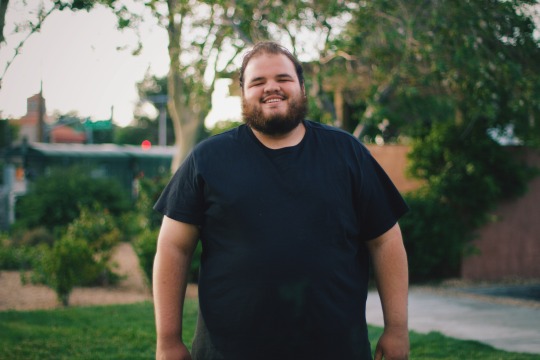
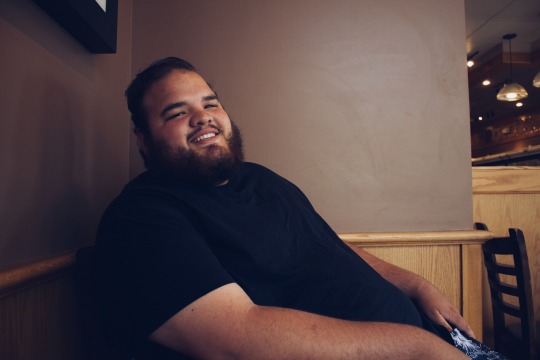
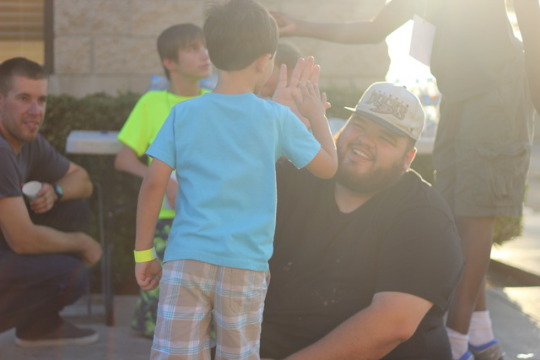
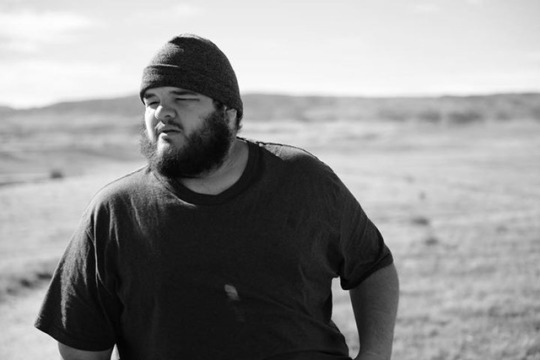
Bottom left courtesy of Justin Troy. Bottom right courtesy of Jeremiah Claudhill.
Juan
5/100
When I first met Juan he was known to give the best hugs. Perhaps it’s because of his unabashed love for people. He can’t help himself but to love on others. “I have a passion for people.” Juan is a Youth Pastor at a local church.
I had a great time sipping on ice tea, trying to beat the heat outside, and having a great conversation with Juan. We spoke about everything from the glory days of our favorite football team, the Raiders, back in the 80’s to comic book movies and great documentaries, which he is an avid fan of, to loving people as Jesus loves people no matter their past or lifestyle. Juan quotes Saint Francis of Assisi who said “Preach the Gospel at all times and when necessary use words.”
Juan believed strongly that expressing love to people through our actions is the best way to lead people to Jesus, even to those who don’t love us back. “It’s about bringing heaven to people,” says Juan.
He is currently in a season of passion and seeking authenticity. “There is so much more than the surface level love that we express.” He spoke so eloquently about passion having a deeper meaning than just having a strong desire for something, but also meaning enduring pain and the countless hours of persistence needed to perfect your craft. He brings up examples such as the apostle Paul, when he languished in prison and beaten severely for his passion for the Lord, or musicians locking themselves away for eight hours a day, for years on end to practice their instruments.
Before he dies he wants to write a book and leave a legacy that will lead people to Jesus.
When asked what piece of advice would he give his younger self he replied, “Stop hiding.”
95 stories to go.
0 notes
Photo
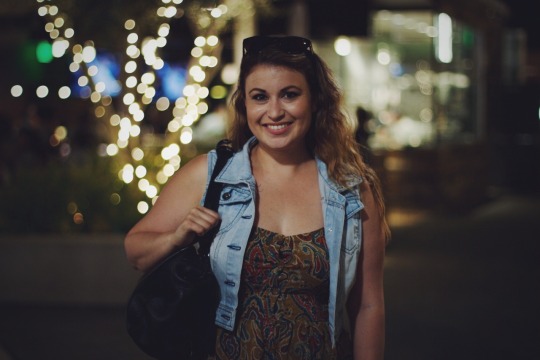
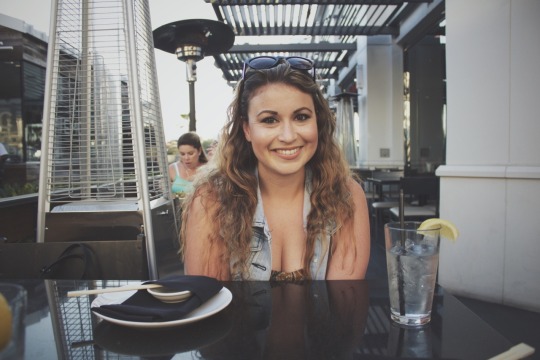
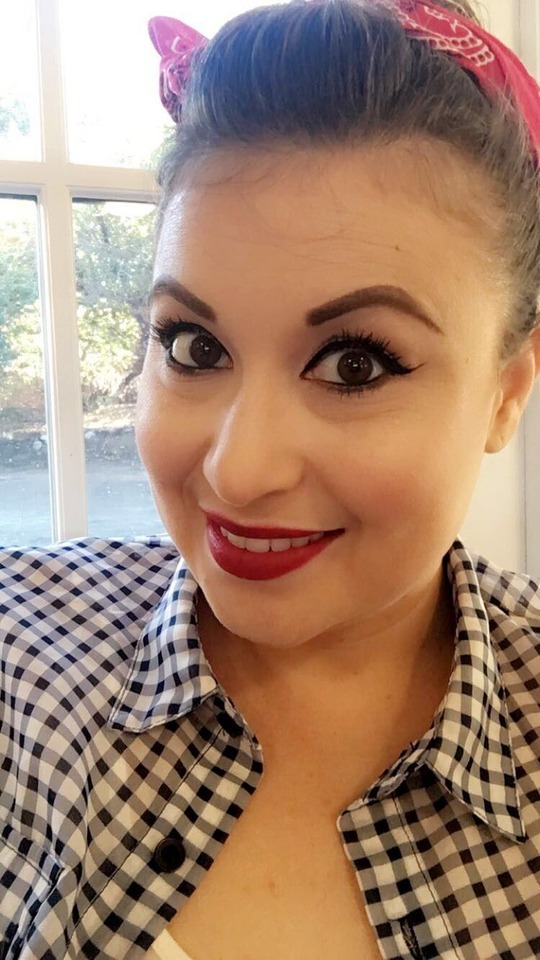
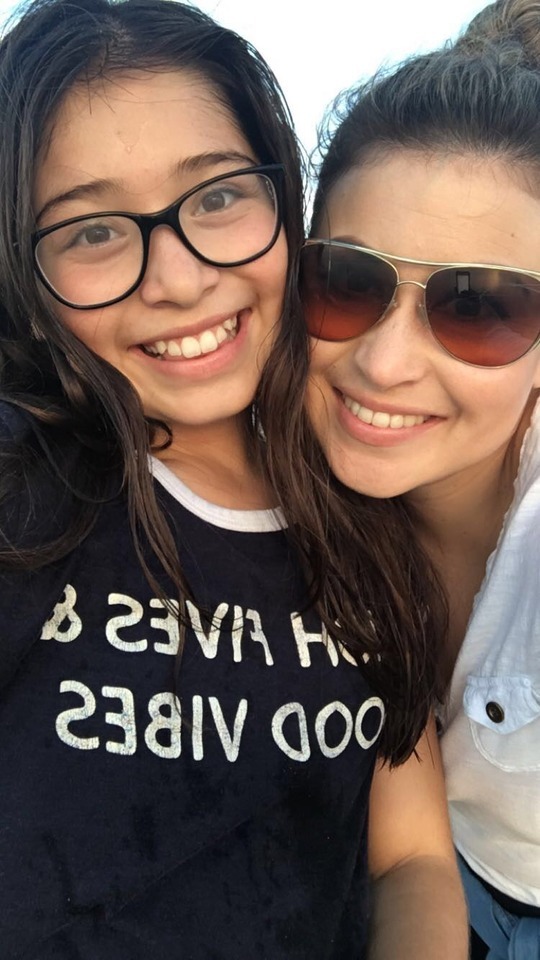
Bottom photographs courtesy of Jessica.
Jessica
3/100
Jessica has been a Director for a leading company in the cosmetic industry, a Manager for a top hair care line, but her greatest and proudest achievement is being a mother to a beautiful twelve year old girl. Jessica is currently in a season of determination as she looks to reignite her passion for growth and learning in her field, after transitioning to a new job. She is adamant about not settling for the norm or mediocre standards for yourself when you know your potential. “But I’m also learning to find a balance between being driven and remaining patient.”
While sitting across this mother her love for her daughter was palpable and quite moving. “My daughter is my biggest motivation and inspiration. I work hard to not only provide for her but also to be her greatest role model. She is always on my mind. She is my world, my heaven and sometimes my hell,” said Jessica jokingly. “I had her when I was young so I don’t know where I would be in my life had she not been born, or if I would have achieved as much as I’ve had in my life.”
When asked what piece of advice would you give your younger self, she replied, “Don’t settle and don’t be afraid to speak up and stand up for yourself.”
Before she dies she would like to travel more but most of all set a solid foundation for her daughter so she can live a better life than she had.
After my time with Jessica I left looking forward to the day when I will blessed with a beautiful daughter or son of my own that I will love more than myself.
97 stories to go.
2 notes
·
View notes